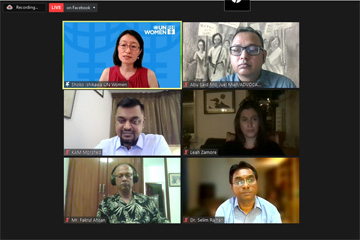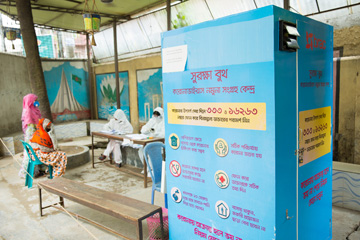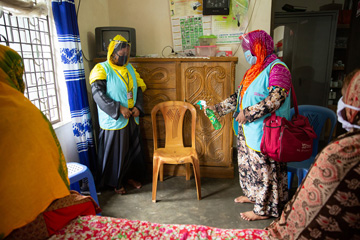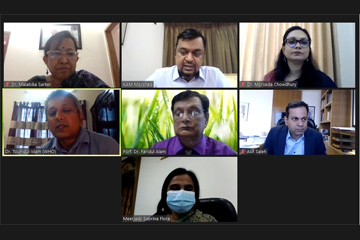
English (959)
Children categories
Demographic and socio-economic changes induced by the Covid-19 pandemic
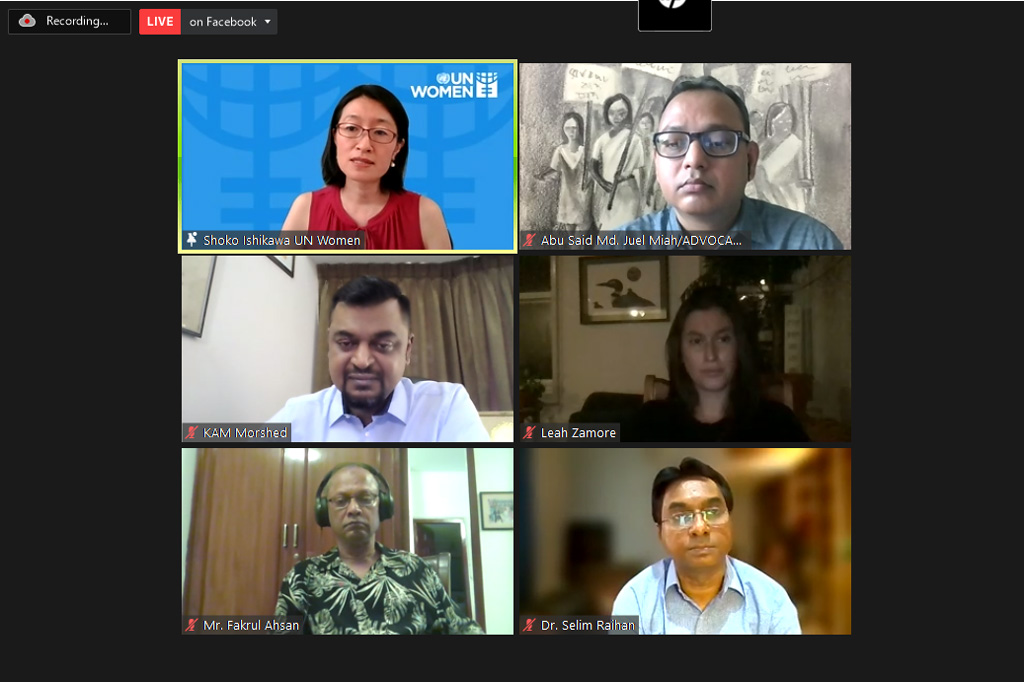
77% of the returnee migrants struggling to find jobs, child marriages saw 26% jump in two years
Around 77% of the returning migrants in Bangladesh were struggling to find a job between April and November last year because of covid-19 pandemic. Among the migrant households with returnees, 61% had at least one member who lost a job or earning opportunity during the covid-19 pandemic.
More than three-fourth (77%) of the marriages that took place in households during surveyed period had brides who were under the age of 18, which is 26% higher than the national rate of child marriage (51%) in 2018. Child marriages were found to be more prevalent in rural areas (81%) than in urban locations (70%).
These are the outcomes of a research jointly conducted by BRAC, UN WOMEN Bangladesh and the Center on International Cooperation at New York University. The research looks into the changes in demographic, economic, and social environments in secondary towns, peri-urban (upazila), and rural areas brought on by the reverse migrations during the COVID-19 pandemic.
Findings of the research titled “Demographic and socio-economic changes induced by the Covid-19 pandemic: Challenges of new circumstances” was unveiled at a virtual policy dialogue today morning, Saturday (08 May 2021). A panel of distinguished experts, academics, policymakers, and development professionals shared their valuable insights at the dialogue. They also discussed the policy priority areas identified by the study findings and way forward.
Dr. Shamsul Alam, Member (Senior Secretary), General Economics Division, Planning Commission attended the dialogue as the Chief Guest. Representatives from the Ministry of Expatriate Welfare and Overseas Employment, the Ministry of Women and Children Affairs, South Asian Network on Economic Modelling (SANEM), Dhaka University, the Center on International Cooperation at New York University, UN Women Bangladesh Office, UNDP Bangladesh, and BRAC joined as discussants.
A survey was conducted with 6,370 households during 10-25 December 2020 as part of the study that applied both quantitative and qualitative techniques. The survey considered April-November 2020 as reference period. The study calls attention specifically to the impact of the COVID-19 on internal and international migration, including returnee migrants who were forced to return to their places of origin due to various circumstances during the pandemic.
One-fourth (25%) of returnee migrant households are concerned over repaying their outstanding migration loans, which amount to an average of BDT 76,000 (around USD 900), and a maximum of BDT 700,000 (around USD 8300), the study found. Around 44% reported that they could not find any income-generating work and some of them are managing expenses by withdrawing from savings or using rent from assets.
The surveyed households reported a 58% decrease in monthly remittances received on an average during the pandemic that is in stark contrast with the national reports of higher flow of remittances during this period. However, a plausible explanation lies in previous researches that suggest almost half of the remittances received by the households under normal circumstances are through unofficial channels (such as hundi houses, travelers carrying money, etc.), which were unavailable during the pandemic.
The returnee migrant families will put pressure on the existing limited resources, especially in education and health sectors. The study found that 4.57% amongst the returnee population were school-aged children (age 5 to 16 years). If these children cannot return to their previous schools after the schools reopen, the educational institutions in local host communities will be under pressure. Furthermore, 13.35% of returnees (both external and internal) are above 40 years of age, and 4.56% are above 50 years of age. They have a lesser chance of re-migration, which has significant implications for the health services, especially on the services related to non-communicable diseases.
The female returnee migrants, mostly internal migrants, have been subjected to heightened burden during the pandemic. They identified inability to engage in productive or income-generating work (74%), problems in moving freely in the streets and marketplaces (26.8%), problems in adjusting with local culture and absence of social utilities (20%), and increased burden of household chores and problems in child-rearing and ensuring their education (18%) as major problems faced by them.
In general, the economic disruptions caused by COVID-19 left many people jobless, especially in the low-income and informal economy. Around 34% of all surveyed households had at least one member who lost jobs or earning capacity and became economically inactive. Moreover, over three-quarters of sample households (77%) saw a decrease in their average monthly income during the pandemic.
The average monthly savings of households decreased by 62% on average, and household debt increased by 31%, as they depleted their savings and borrowing money to manage their daily expenses. The average monthly expenditure on the other hand fell by only 8.6%.
The study suggests that the expected crude birth rate in 2020 is 20.2 (per 1000 people) in the surveyed households which is higher than the national crude birth rate in 2018 (18.2). The average family size was found to be 4.7, which is higher than the pre-pandemic national average of 4.06 (HIES 2016).
After dissemination of the survey findings, chief guest of the policy dialogue Dr. Shamsul Alam, Member (Senior Secretary), General Economic Division, Bangladesh Planning Commission, said in his speech, “Forced migration created frustration among people, particularly for women. We have to think over how to create economic opportunities for them. We need a recovery plan -- budget is a kind of recovery plan.”
Ms. Shoko Ishikawa, Country Representative, UN Women Bangladesh stated, “Even without data, child marriage has been a problem. Migrants are seeing stress in loss of income. Social safety nets need to look into how to support these migrant families e.g. creating more jobs, finding the right kind of skills training.”
Dr. Selim Raihan, Executive Director, SANEM and Professor of Economics, Dhaka University opined, “When we are talking about recovery and coping strategies, these studies are very important. It is now time to involve all stakeholders including people’s representatives, business, led by the government, and talk about economic plus social recovery.
Download: Brief executive summary for policy dialogue
Download: Policy dialogue presenatation 8 May 2021
স্যার ফজলে হাসান আবেদের ডা. ইব্রাহিম স্মারক ভাষণ
বাংলাদেশ ডায়াবেটিক সমিতির অফিসার্স ক্লাব ব্র্যাকের প্রতিষ্ঠাতা স্যার ফজলে হাসান আবেদকে ইব্রাহিম স্মারক স্বর্ণপদকে ভূষিত করে। শিক্ষা, কৃষি, স্বাস্থ্য, পরিবার পরিকল্পনা, পল্লী উন্নয়ন, ডায়রিয়া নিয়ন্ত্রণ তথা আর্থসামাজিক উন্নয়নের ক্ষেত্রে বিশেষ অবদানের স্বীকৃতিস্বরূপ এই স্মারক স্বর্ণপদক প্রদান করা হয়। ২৯শে সেপ্টেম্বর ১৯৯৪ মরহুম ডা. মোহাম্মদ ইব্রাহিমের ষষ্ঠ মৃত্যুবার্ষিকী উপলক্ষে বারডেম মিলনায়তনে ডা. মোহাম্মদ ইব্রাহিম স্মারক বক্তৃতা ও স্বর্ণপদক প্রদান অনুষ্ঠানের আয়োজন করা হয়েছিল। অনুষ্ঠানে স্যার ফজলে হাসান আবেদ স্মারক বক্তৃতা প্রদান করেন। বক্তৃতাটি পাঠকদের জন্য প্রকাশ করা হলো।
ডা. মোহাম্মদ ইব্রাহিম স্মারক ভাষণ প্রদানের জন্যে আমন্ত্রিত হয়ে আমি নিজেকে ধন্য মনে করছি। যেসব বিরল ব্যক্তিত্ব তাদের স্বপ্ন আর শ্রম, ত্যাগ আর তিতিক্ষা, সচেতনতা আর কর্তব্যবোধ দ্বারা এই বাংলায় আমাদের এই প্রজন্মের জীবনমান ও মূল্যবোধ উন্নততর করার বলিষ্ঠ প্রয়াস নিয়েছেন, ডা. মোহাম্মদ ইব্রাহিম তাদেরই একজন। বাংলাদেশের গর্ব এই অত্যাধুনিক হাসপাতালটি অথবা ইট-সুরকির অন্যকোনো সুরম্য অট্টালিকা অথবা সুবৃহৎ অবকাঠামোর মাঝে আমরা ডা. ইব্রাহিমের স্মৃতি সন্ধান করি না। তাকে আমরা আবিষ্কার করি, তাঁকে আমরা খুঁজে পাই এ দেশের মানুষের উন্নয়নকল্পে তাঁর সর্ববিধ চিন্তার গভীরে। কারণ তিনি কেবলমাত্র একজন স্বনামধন্য চিকিৎসকই ছিলেন না, ছিলেন না শুধু একজন নিবেদিতপ্রাণ শিক্ষাবিদ, সুযোগ্য মন্ত্রী অথবা সুদক্ষ সংগঠক, তিনি ছিলেন সব মানুষের মাঝে একজন অনন্যসাধারণ মানুষ, যিনি আমাদের যাত্রাপথ আলোকিত করে গেছেন। তাই ডা. মোহাম্মদ ইব্রাহিম আমাদের ইতিহাসের একজন চিরবরেণ্য ব্যক্তিত্ব।
এটি আমাদের অনেকের সৌভাগ্য যে, কর্মব্যস্ত এই মানুষটির কর্মব্যাপ্তি এবং কর্মক্ষমতা কাছে থেকে প্রত্যক্ষ করার সুযোগ হয়েছে। এক অর্থে তিনি ছিলেন বাংলাদেশে আমার মতো আজকের হাজারও সমাজকর্মীর পূর্বসূরি। মানবউন্নয়নে অহেতুক সরকার নির্ভরতায় তিনি বিশ্বাসী ছিলেন না। তার গভীর বিশ্বাস ছিল যে, একজন নাগরিকের দাবি, তার নাগরিক দায়িত্ব থেকে বিচ্ছিন্ন নয়। সমাজ উন্নয়নে তাই সদাসর্বদা সরকারের মুখাপেক্ষী হওয়া একটি স্বাধীন দেশের আদর্শ নাগরিকের ধর্ম হওয়া উচিত নয়।
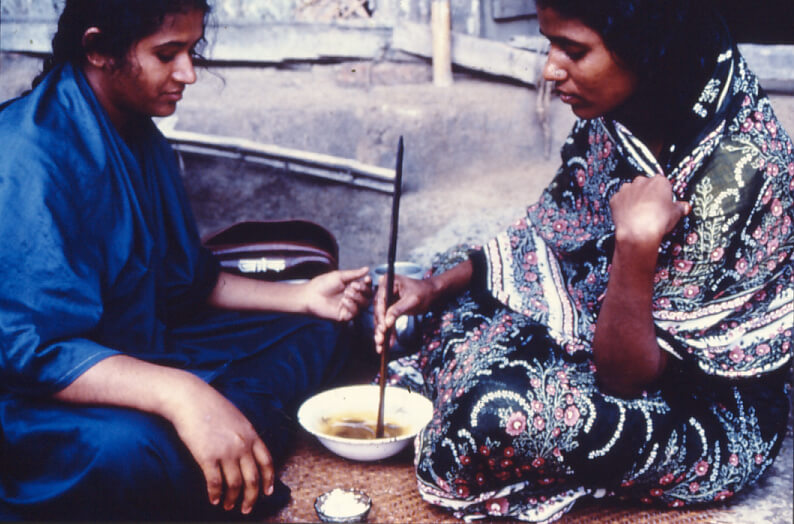 আজ এই মঞ্চে দাঁড়িয়ে মনের গহনে সঞ্চিত এই অসাধারণ মানুষটির অনেক স্মৃতির মাঝে একটিরই কথা বলব। আজ থেকে প্রায় একযুগ আগে ১৯৮৫ সালের দিনগুলো আমার জন্যে ছিল অত্যন্ত কর্মব্যস্ত। ব্র্যাক তখন ডায়রিয়া নিরাময়ের সহজ চিকিৎসা, মুখে খাওয়ার স্যালাইন প্রস্তুত ও ব্যবহার পদ্ধতি গ্রামবাংলার প্রতিটি ঘরে পৌঁছে দেওয়ার দায়িত্ব নিয়েছে। আমার অফিসে এক ভোরে টেলিফোন বাজল। অপর প্রান্তে ডা. ইব্রাহিম। তিনি বললেন, গ্রামবাংলায় আমাদের ডায়রিয়াকেন্দ্রিক কর্মকাণ্ড মনোযোগের সঙ্গে প্রত্যক্ষ করছেন। আমাদের কাজের প্রশংসা তিনি করলেন, করলেন উৎসাহব্যঞ্জক অনেক উক্তি। কিন্তু তার পরের প্রশ্নটিই ডা. ইব্রাহিমকে নিয়ে গেল সাধারণ একজন উৎসাহদাতার অনেক ঊর্ধ্বে। তিনি বললেন, আচ্ছা, বলুন তো, আমাদের বহুমূত্র চিকিৎসাজনিত নগরকেন্দ্রিক কর্মকাণ্ডকে কীভাবে গ্রামবাংলায় ছড়িয়ে দেওয়া যায়? তিনি আমাকে এই হাসপাতালে তার সঙ্গে সাক্ষাতের আমন্ত্রণ করলেন। নিজে হাসপাতালটি তিনি আমাকে ঘুরিয়ে দেখালেন। আমরা তার উত্থাপিত সমস্যাটি সম্বন্ধে আলাপ-আলোচনা করলাম। বলাই বাহুল্য, তার প্রশ্নটির কোনো নিশ্চিত উত্তর আমার জানা ছিল না। আজও নেই, কারণ বহুমূত্ররোগ নিরোধ ও চিকিৎসা আর সাধারণ ডায়রিয়া বহুমূত্র রোগসম্পর্কিত বিষয়াদিতে ডা. ইব্রাহিমের অমূল্য অবদান আজ দেশদেশান্তরে সর্বজনবিদিত। আমার দৃষ্টিতে তাঁর এই সাধারণ প্রশ্নটি ছিল তাঁর পেশাগত জীবনের স্বপ্নপ্রসূত, তাঁর বহুযুগের পুঞ্জীভূত বাসনার অভিব্যক্তি, তাঁর আকাঙ্ক্ষার প্রকাশ। এই প্রশ্নটিরই মাঝে আমরা দেখতে পাই একজন সাধারণ নাগরিক এবং একজন অসাধারণ মানুষের মাঝেকার যোজনের ব্যবধান।
আজ এই মঞ্চে দাঁড়িয়ে মনের গহনে সঞ্চিত এই অসাধারণ মানুষটির অনেক স্মৃতির মাঝে একটিরই কথা বলব। আজ থেকে প্রায় একযুগ আগে ১৯৮৫ সালের দিনগুলো আমার জন্যে ছিল অত্যন্ত কর্মব্যস্ত। ব্র্যাক তখন ডায়রিয়া নিরাময়ের সহজ চিকিৎসা, মুখে খাওয়ার স্যালাইন প্রস্তুত ও ব্যবহার পদ্ধতি গ্রামবাংলার প্রতিটি ঘরে পৌঁছে দেওয়ার দায়িত্ব নিয়েছে। আমার অফিসে এক ভোরে টেলিফোন বাজল। অপর প্রান্তে ডা. ইব্রাহিম। তিনি বললেন, গ্রামবাংলায় আমাদের ডায়রিয়াকেন্দ্রিক কর্মকাণ্ড মনোযোগের সঙ্গে প্রত্যক্ষ করছেন। আমাদের কাজের প্রশংসা তিনি করলেন, করলেন উৎসাহব্যঞ্জক অনেক উক্তি। কিন্তু তার পরের প্রশ্নটিই ডা. ইব্রাহিমকে নিয়ে গেল সাধারণ একজন উৎসাহদাতার অনেক ঊর্ধ্বে। তিনি বললেন, আচ্ছা, বলুন তো, আমাদের বহুমূত্র চিকিৎসাজনিত নগরকেন্দ্রিক কর্মকাণ্ডকে কীভাবে গ্রামবাংলায় ছড়িয়ে দেওয়া যায়? তিনি আমাকে এই হাসপাতালে তার সঙ্গে সাক্ষাতের আমন্ত্রণ করলেন। নিজে হাসপাতালটি তিনি আমাকে ঘুরিয়ে দেখালেন। আমরা তার উত্থাপিত সমস্যাটি সম্বন্ধে আলাপ-আলোচনা করলাম। বলাই বাহুল্য, তার প্রশ্নটির কোনো নিশ্চিত উত্তর আমার জানা ছিল না। আজও নেই, কারণ বহুমূত্ররোগ নিরোধ ও চিকিৎসা আর সাধারণ ডায়রিয়া বহুমূত্র রোগসম্পর্কিত বিষয়াদিতে ডা. ইব্রাহিমের অমূল্য অবদান আজ দেশদেশান্তরে সর্বজনবিদিত। আমার দৃষ্টিতে তাঁর এই সাধারণ প্রশ্নটি ছিল তাঁর পেশাগত জীবনের স্বপ্নপ্রসূত, তাঁর বহুযুগের পুঞ্জীভূত বাসনার অভিব্যক্তি, তাঁর আকাঙ্ক্ষার প্রকাশ। এই প্রশ্নটিরই মাঝে আমরা দেখতে পাই একজন সাধারণ নাগরিক এবং একজন অসাধারণ মানুষের মাঝেকার যোজনের ব্যবধান।
ডা. মোহাম্মদ ইব্রাহিমের চিন্তাভাবনা আর ধ্যানধারণার কেন্দ্রে ছিল এ দেশের মানুষের জনস্বাস্থ্যের উন্নতি। আজ তাই এত গুণিজনের উপস্থিতিতে তার এই স্মারক সভায় জনস্বাস্থ্য সম্বন্ধীয় দুয়েকটি বিষয়ের অবতারণা করতে চাই।
আজ বিংশ শতাব্দীর এই অন্তিমলগ্নে এসে আমরা উপলব্ধি করি যে, এই অতিক্রান্ত শতাব্দীটি মানবসভ্যতার অগ্রগতির ক্ষেত্রে রেখেছে বিস্ময়কর অবদান। এই শতাব্দীতেই মানুষ শুধু যে উড়তে শিখল তা নয়, উড়ে বেড়াল অন্তরীক্ষে, পায়ে হাঁটল চাঁদের বুকে, আণবিক বিজ্ঞান আর প্রযুক্তিকে নিয়ে গেল সৃষ্টি আর ধ্বংসের একটি রোমাঞ্চকর পর্যায়ে। এই শতাব্দীতেই এভারেস্ট বিজয়ী মানুষ অতিক্রম করল মেরুদ্বয়।
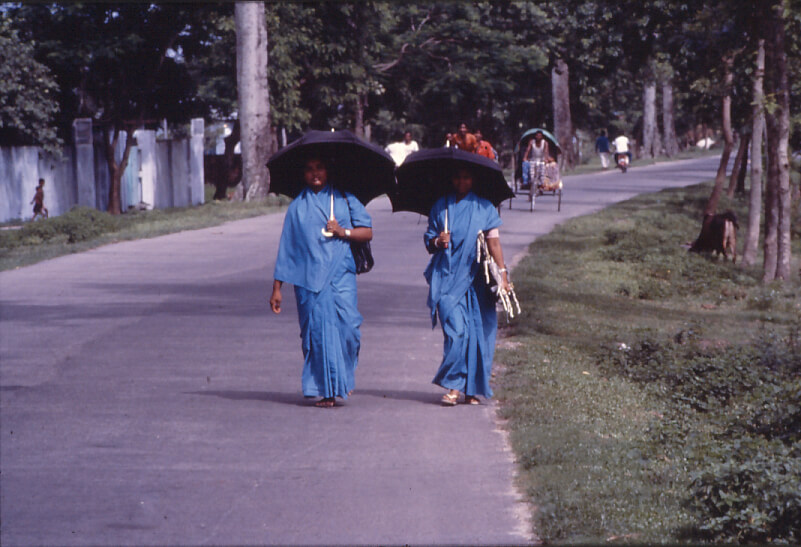 স্বাস্থ্যের ক্ষেত্রে এই শতাব্দীতে আমরা লাভ করেছি অভাবনীয় প্রগতি। বিগত শতাব্দীর ভীতিদায়ক প্রাণনাশক সব মহামারি আজ বিগত দিনেরই ইতিহাস। কিন্তু একথা অনস্বীকার্য যে, মানুষের অগ্রগতির প্রায় সকল ক্ষেত্রেই বিশ্বের নাটকীয় এই বিবর্তন পাশ্চাত্যেই হয়েছে। পরিবর্তনের সকল হাওয়াই বয়েছে পাশ্চাত্য বিশ্ব থেকে। মানবস্বাস্থ্যক্ষেত্রে বিস্ময়কর অগ্রগতি তার ব্যতিক্রম নয়।
স্বাস্থ্যের ক্ষেত্রে এই শতাব্দীতে আমরা লাভ করেছি অভাবনীয় প্রগতি। বিগত শতাব্দীর ভীতিদায়ক প্রাণনাশক সব মহামারি আজ বিগত দিনেরই ইতিহাস। কিন্তু একথা অনস্বীকার্য যে, মানুষের অগ্রগতির প্রায় সকল ক্ষেত্রেই বিশ্বের নাটকীয় এই বিবর্তন পাশ্চাত্যেই হয়েছে। পরিবর্তনের সকল হাওয়াই বয়েছে পাশ্চাত্য বিশ্ব থেকে। মানবস্বাস্থ্যক্ষেত্রে বিস্ময়কর অগ্রগতি তার ব্যতিক্রম নয়।
আমি মনে করি, স্বাস্থ্যক্ষেত্রে বিংশ শতাব্দীর অভূতপূর্ব উন্নতি সাধিত হয়েছে দুই কিস্তিতে। শতাব্দীর সূচনা থেকে দ্বিতীয় মহাযুদ্ধ অথবা পঞ্চাশের দশকের প্রারম্ভ পর্যন্ত রচিত হয়েছে সেই অগ্রগতির প্রথম ধাপ এবং তা হয়েছে পাশ্চাত্য বিশ্বে। তখনও প্রাচ্যের অধিকাংশ দেশই পরাধীন। সাম্রাজ্যবাদের অক্টোপাসের বাধন প্রাচ্যে তখনও হয় নি শিথিল। স্বাস্থ্যক্ষেত্রে আমরা তখনও মধ্যযুগীয়। আজ আমরা পাশ্চাত্য জগতে মানবস্বাস্থ্য সংরক্ষণে আর নিরাময় আবিষ্কারে যে যুগান্তকারী বিবর্তন প্রত্যক্ষ করছি, তার ভিত্তি স্থাপিত হয়েছিল স্বাস্থ্যক্ষেত্রে উন্নতির সেই প্রথম ধাপে, এই শতাব্দীর প্রথম পাচটি দশকে। সেই অর্ধশতকে আমাদের ভূখণ্ডে স্বাস্থ্যক্ষেত্রে উন্নতির হাওয়ায় তখনও পাল ধরে নি।
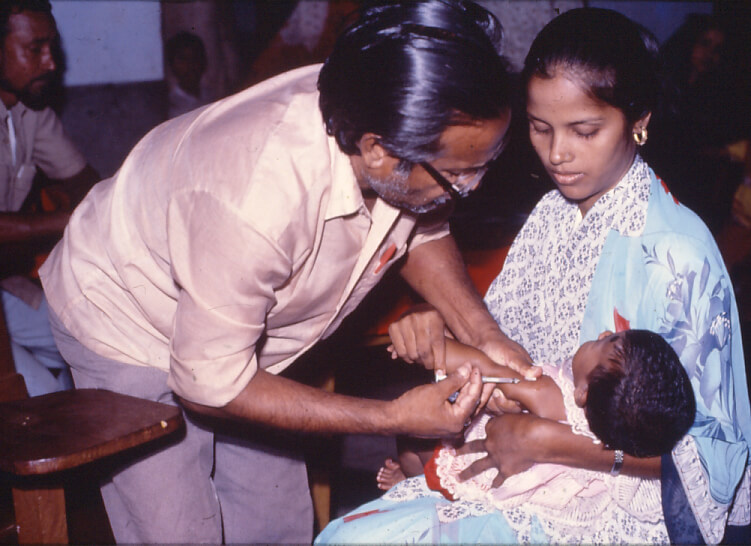 শতাব্দীর প্রথমভাগে পাশ্চাত্যে এই উন্নতি সাধিত হয়েছিল মানবস্বাস্থ্যের মান উন্নয়নের বিবিধ ক্ষেত্রে, বিশেষ করে রোগপ্রতিরোধক ব্যবস্থায় নতুন নতুন প্রবর্তনে। দুধ পাস্তুরিকরণ, পানিকে ক্লোরিনযুক্ত করা, উন্নততর পয়ঃব্যবস্থা, ব্যক্তি স্বাস্থ্যব্যবস্থার নিশ্চিতকরণ, সুষম খাদ্য এবং খাদ্যপচনরোধ বিষয়ে স্বাস্থ্য শিক্ষাদান, টিকা আবিষ্কার এবং তার ব্যবহার, সীমিত পরিবারের উপর গুরুত্ব প্রদান ইত্যাদি ঘটেছিল সেই সময়েই। বলাই বাহুল্য, এই যুগান্তকারী পরিবর্তনটি সাধিত হয়েছিল মানব কর্মকাণ্ডের বিকাশের এক অভূতপূর্ব সমন্বয়ের মাধ্যমে, যেখানে জনস্বাস্থ্য ক্ষেত্রে পুরোভাগে ছিলেন বিজ্ঞানী, শিক্ষাবিদ, গবেষক, চিকিৎসক, প্রকৌশলী সমাজবিজ্ঞানীরা। অচিরেই তার প্রতিফলন পড়ল পাশ্চাত্যের জনস্বাস্থ্য ব্যবস্থায়। শিশু মৃত্যুহার, গৰ্ভজাত মৃত্যু, পুষ্টিহীনতা, জন্মহার সবই নাটকীয়ভাবে হ্রাস পেল । আর তার ফলে পাশ্চাত্যে স্থাপিত হলো বর্তমান অর্ধশতকের পরিবর্তনের ভিত্তি। এই শতাব্দীর প্রথমভাগে রোগ প্রতিরোধ ব্যবস্থা সুদৃঢ়করণের পর পাশ্চাত্য জগৎ তার দৃষ্টি নিবদ্ধ করল রোগ প্রতিকারের ওপর।
শতাব্দীর প্রথমভাগে পাশ্চাত্যে এই উন্নতি সাধিত হয়েছিল মানবস্বাস্থ্যের মান উন্নয়নের বিবিধ ক্ষেত্রে, বিশেষ করে রোগপ্রতিরোধক ব্যবস্থায় নতুন নতুন প্রবর্তনে। দুধ পাস্তুরিকরণ, পানিকে ক্লোরিনযুক্ত করা, উন্নততর পয়ঃব্যবস্থা, ব্যক্তি স্বাস্থ্যব্যবস্থার নিশ্চিতকরণ, সুষম খাদ্য এবং খাদ্যপচনরোধ বিষয়ে স্বাস্থ্য শিক্ষাদান, টিকা আবিষ্কার এবং তার ব্যবহার, সীমিত পরিবারের উপর গুরুত্ব প্রদান ইত্যাদি ঘটেছিল সেই সময়েই। বলাই বাহুল্য, এই যুগান্তকারী পরিবর্তনটি সাধিত হয়েছিল মানব কর্মকাণ্ডের বিকাশের এক অভূতপূর্ব সমন্বয়ের মাধ্যমে, যেখানে জনস্বাস্থ্য ক্ষেত্রে পুরোভাগে ছিলেন বিজ্ঞানী, শিক্ষাবিদ, গবেষক, চিকিৎসক, প্রকৌশলী সমাজবিজ্ঞানীরা। অচিরেই তার প্রতিফলন পড়ল পাশ্চাত্যের জনস্বাস্থ্য ব্যবস্থায়। শিশু মৃত্যুহার, গৰ্ভজাত মৃত্যু, পুষ্টিহীনতা, জন্মহার সবই নাটকীয়ভাবে হ্রাস পেল । আর তার ফলে পাশ্চাত্যে স্থাপিত হলো বর্তমান অর্ধশতকের পরিবর্তনের ভিত্তি। এই শতাব্দীর প্রথমভাগে রোগ প্রতিরোধ ব্যবস্থা সুদৃঢ়করণের পর পাশ্চাত্য জগৎ তার দৃষ্টি নিবদ্ধ করল রোগ প্রতিকারের ওপর।
দ্বিতীয় মহাযুদ্ধ উত্তরকালে রচিত হলো বিশ্বের আধুনিক স্বাস্থ্যব্যবস্থার অবকাঠামো। স্বাস্থ্যক্ষেত্রে মূলত নতুন নতুন আবিষ্কার চিকিৎসার পথকে সুগম করল। পেনিসিলিন আবিষ্কার, নতুন অ্যান্টিবায়োটিকের উদ্ভাবন, শল্য চিকিৎসার ক্ষেত্রে অবিশ্বাস্য অগ্রগতি স্বাস্থ্যব্যবস্থায় করল একটি নতুন দিগন্তের উন্মোচন। পাশ্চাত্য জগতের সর্বত্রই গড়ে উঠল আধুনিক সুযোগসুবিধাসম্পন্ন নতুন হাসপাতাল আর স্বাস্থ্যকেন্দ্র। মানুষ লাভ করল অত্যাধুনিক চিকিৎসাব্যবস্থার সর্ববিধ সুফল।
সেই সময়ে আমরা প্রাচ্যে ঔপনিবেশিক সরকারের অবসানে সবেমাত্র স্বাধীন হয়েছি। কিন্তু স্বাধীনতা লাভকালে আমাদের দেশসমূহে স্বাস্থ্যব্যবস্থা ছিল মধ্যযুগীয়। স্বাস্থ্যক্ষেত্রে সাম্রাজ্যবাদীদের আওতায় আমরা ছিলাম অন্ধকারাচ্ছন্ন একটি পরিবেশে। সেই পরিবেশে সম্ভব ছিল না কোনো অগ্রগতি, অসম্ভব ছিল একটি নতুন স্বাস্থ্যব্যবস্থার ভিত্তি নির্মাণ। এদিকে স্বাধীনতার সঙ্গেসঙ্গেই আমাদের মাঝে জাগরূক হলো দ্রুত পরিবর্তনের প্রয়োজনীয়তা সম্পর্কে সচেতনতাবোধ। সেই মুহূর্তে আমি মনে করি, আমরা অনেকেই স্বাস্থ্যক্ষেত্রে উন্নতির সোপানে দ্রুত আরোহণের জন্য এমন একটি পন্থা অবলম্বন করলাম, যা বহুলাংশে সঠিক ছিল না। আমরা রোগ প্রতিরোধের ব্যবস্থাদির ভিত্তি সুদৃঢ় না করে মনোনিবেশ করলাম রোগ প্রতিকারের ওপর, পাশ্চাত্য দেশসমূহের অন্ধ অনুকরণে। এই শতাব্দীর প্রথমভাগে বিশ্বস্বাস্থ্যব্যবস্থায় রোগপ্রতিরোধের প্রয়োজনীয় ব্যবস্থাদি গ্রহণ ডিঙ্গিয়েই যেন আমরা যেতে চাইলাম রোগ প্রতিকারের অঙ্গনে, পাশ্চাত্যের অনুকরণে আধুনিক স্বাস্থ্যব্যবস্থার উপযোগী হাসপাতাল ইত্যাদি স্থাপনের উদ্যোগে। আমরা আমাদের অনেক মেধাবী চিকিৎসকদের বিদেশে প্রেরণ করলাম বড় বড় ডিগ্রি লাভের জন্য। জনস্বাস্থ্যব্যবস্থার ভিত্তি রচনা না করেই আমরা রোগ প্রতিকারের অবকাঠামো অর্থাৎ আধুনিক হাসপাতাল আর স্বাস্থ্যকেন্দ্র স্থাপনায় নিয়োজিত হলাম। কিন্তু তখনও আমাদের মতো দেশগুলোতে জনস্বাস্থ্যব্যবস্থার অবস্থা ছিল ভয়াবহ। শুধু তাই নয়, আজ বিংশ শতাব্দীর এই অন্তিম লগ্নেও আমাদের দেশে শতকরা মাত্র ২০ ভাগ অথবা তার চাইতেও কম লোক রয়েছে স্বাস্থ্যসম্মত পয়ঃপ্রণালীর আওতায়, আমাদের অধিকাংশ মানুষ এখনও আয়োডিনযুক্ত লবণ ভক্ষণ করেন না, ব্যক্তিস্বাস্থ্য অর্থাৎ পার্সোনাল হাইজিন সম্বন্ধে আমাদের অধিকাংশ মানুষই এখনও উদাসীন।
তবে গত কয়েক বছরে জনস্বাস্থ্য উন্নয়নক্ষেত্রে, আমাদের ভূখণ্ডে সন্তুষ্টিদায়ক কিছু পদক্ষেপ গ্রহণ করা হয়েছে। স্বাস্থ্যক্ষেত্রে হারানো এই শতাব্দীর প্রথম ৫০টি বছর, সঙ্কুচিত সময়ের মাঝে অতিক্রম করার প্রচেষ্টা বিবিধ ক্ষেত্রে পরিলক্ষিত হচ্ছে। গত ৬-৭ বছরের মাঝে আমাদের দেশে টিকাদানের হার জনগোষ্ঠীর ২ শতাংশ থেকে ৭০ শতাংশে উন্নীত করা হয়েছে ।
 উন্নতির উচ্চ এই হারকে টিকিয়ে রাখা এখন হওয়া উচিত আমাদের নিরন্তর প্রচেষ্টা। পরিবার পরিকল্পনা ক্ষেত্রে আমাদের দেশে সরকারি এবং বেসরকারি উদ্যোগের সাফল্য আজ সর্বজনস্বীকৃত। গ্রামবাংলায় আমাদের দুর্বলতম জনগোষ্ঠী, নারী সমাজের সকল প্রকার উন্নয়ন কর্মকাণ্ডে অংশগ্রহণ নিশ্চিত করার জন্য চলছে ব্যাপক প্রচেষ্টা। ব্র্যাকের কর্মী হিসেবে বাংলাদেশের ৩৫ হাজার গ্রামের প্রায় ২০ লক্ষ মহিলা আর শিশুকে সংগঠিত করার রোমাঞ্চকর কর্তব্যে নিযুক্ত থেকে বলতে পারি, দেশে আজ স্বাস্থ্য উন্নয়নের জন্য প্রয়োজনীয় একটি ভিত্তি আমরা স্থাপনে সক্ষম হচ্ছি। সার্বজনীন প্রাথমিক শিক্ষা এবং অষ্টম শ্রেণি পর্যন্ত মেয়েদের বিনা খরচে শিক্ষা প্রবর্তন করার আইন দেশে একটি উপযুক্ত শিক্ষাব্যবস্থার পরিবেশ সৃষ্টি করতে পারবে বলে আমরা আশা করছি। কিন্তু আমাদের দেশে সমস্যা এমনই প্রকট যে, সক্রিয় বেসরকারি সাহায্য ছাড়া কেবলমাত্র সরকারের পক্ষে আইন প্রণয়ন করে অভীষ্ট লক্ষ্যে পৌঁছানো অসম্ভব। এবং শিক্ষা ব্যতিরেকে স্বাস্থ্য ব্যবস্থার উন্নয়ন অসম্ভব। আপনারা অনেকেই অবগত আছেন, অন্যান্য বেসরকারি উদ্যোগের মাঝে ব্র্যাকও এই ক্ষেত্রে উল্লেখযোগ্য উদ্যোগ নিয়েছে। দেশে আজ ব্র্যাকের ৩০ হাজার বিদ্যালয়ে শিক্ষারত রয়েছে গ্রাম বাংলার প্রায় ১০ লক্ষ দরিদ্র ঘরের শিশু। তাদের মাঝে শতকরা ৭০ ভাগ রয়েছে মেয়েশিশু।
উন্নতির উচ্চ এই হারকে টিকিয়ে রাখা এখন হওয়া উচিত আমাদের নিরন্তর প্রচেষ্টা। পরিবার পরিকল্পনা ক্ষেত্রে আমাদের দেশে সরকারি এবং বেসরকারি উদ্যোগের সাফল্য আজ সর্বজনস্বীকৃত। গ্রামবাংলায় আমাদের দুর্বলতম জনগোষ্ঠী, নারী সমাজের সকল প্রকার উন্নয়ন কর্মকাণ্ডে অংশগ্রহণ নিশ্চিত করার জন্য চলছে ব্যাপক প্রচেষ্টা। ব্র্যাকের কর্মী হিসেবে বাংলাদেশের ৩৫ হাজার গ্রামের প্রায় ২০ লক্ষ মহিলা আর শিশুকে সংগঠিত করার রোমাঞ্চকর কর্তব্যে নিযুক্ত থেকে বলতে পারি, দেশে আজ স্বাস্থ্য উন্নয়নের জন্য প্রয়োজনীয় একটি ভিত্তি আমরা স্থাপনে সক্ষম হচ্ছি। সার্বজনীন প্রাথমিক শিক্ষা এবং অষ্টম শ্রেণি পর্যন্ত মেয়েদের বিনা খরচে শিক্ষা প্রবর্তন করার আইন দেশে একটি উপযুক্ত শিক্ষাব্যবস্থার পরিবেশ সৃষ্টি করতে পারবে বলে আমরা আশা করছি। কিন্তু আমাদের দেশে সমস্যা এমনই প্রকট যে, সক্রিয় বেসরকারি সাহায্য ছাড়া কেবলমাত্র সরকারের পক্ষে আইন প্রণয়ন করে অভীষ্ট লক্ষ্যে পৌঁছানো অসম্ভব। এবং শিক্ষা ব্যতিরেকে স্বাস্থ্য ব্যবস্থার উন্নয়ন অসম্ভব। আপনারা অনেকেই অবগত আছেন, অন্যান্য বেসরকারি উদ্যোগের মাঝে ব্র্যাকও এই ক্ষেত্রে উল্লেখযোগ্য উদ্যোগ নিয়েছে। দেশে আজ ব্র্যাকের ৩০ হাজার বিদ্যালয়ে শিক্ষারত রয়েছে গ্রাম বাংলার প্রায় ১০ লক্ষ দরিদ্র ঘরের শিশু। তাদের মাঝে শতকরা ৭০ ভাগ রয়েছে মেয়েশিশু।
সুধীবৃন্দ,
আমি মনেপ্রাণে বিশ্বাস করি যে, সংকুচিত সময়ে উন্নয়ন পথ অতিক্রম করার জন্য প্রয়োজন রয়েছে আমাদের উদ্ভাবনী ক্ষমতা, Capacity for Innovation বৃদ্ধি করার। জনস্বাস্থ্যক্ষেত্রে আমাদের দেশের বিদ্যমান সমস্যাগুলোকে যথাযথভাবে চিহ্নিত করার। উপযুক্ত প্রতিরোধক ব্যবস্থাদি গ্রহণ করার। বহুল ক্ষেত্রেই আমাদের সমস্যা নির্ণয়ে আমরা বহিরাগতদের ওপর প্রয়োজনের অতিরিক্ত আস্থা রাখি। তা অনুচিত। আমাদের যথার্থ সমস্যা চিহ্নিত করা এবং সমাধানের উপায় এবং পন্থা আবিষ্কারের দায়িত্ব আমাদেরই।
শৈশবে শুনেছি, 'যার হয় যক্ষ্মা, তার নেই রক্ষা'। এই কথাটি কে এদেশে বিগত দিনের কথা বলেই ধরে নেওয়া হয়। তবে গ্রামবাংলায় আমাদের অভিজ্ঞতায় আমি বলতে বাধ্য যে, যক্ষ্মার প্রকোপ থেকে আমাদের দেশের অনেক মানুষ আজও রক্ষা পায় না। অথচ নিয়মিত ওষুধ সেবনে যক্ষ্মার সম্পূর্ণ নিরাময় আজকাল অনায়াসে সম্ভব। যক্ষ্মা এদেশে যথেষ্ট পরিমাণে আজও বিদ্যমান, তবে এটা আজ এদেশে যেন একটি বিস্মৃত রোগ। তার কারণ হয়তো এই যে, রোগটি পাশ্চাত্যে আজ প্রায় সম্পূর্ণভাবেই অনুপস্থিত, যার ফলে এই রোগ প্রতিষেধনের ব্যবস্থা নিয়ে তাদের মাথাব্যথা কমই। অবশ্য ‘এইডস’ রোগটির কারণে পাশ্চাত্যে আবার যক্ষ্মার পুনরাবির্ভাব হয়েছে। তবে সে অন্য কথা।
আমাদের দেশে সামাজিক দৃষ্টিকোণ থেকে যক্ষ্মারোগ নির্ণয় বিশেষ সমস্যাসঙ্কুল। কারণ আক্রান্ত ব্যক্তিরা প্রকাশ্যে তাদের যক্ষ্মা রোগ সম্পর্কে কিছুই ব্যক্ত করতে চান না। সেই যুগে যক্ষ্মা ছিল একটি শক্ত ব্যামো। তাই সেই রোগ চেপে যাওয়ার প্রবণতা সমাজে ছিল। আজ যখন রোগটির নিরাময় কঠিন নয়, এই রোগের ত্বরিত চিকিৎসা না করা অবশ্যই বাতুলতা। যক্ষ্মা রোগ থেকে সম্পূর্ণ নিরাময় আজকাল প্রায় নিশ্চিত হলেও সময়সাপেক্ষ। তাই প্রয়োজন রয়েছে এমন একটি চিকিৎসা ব্যবস্থা উদ্ভাবন করার, যা অনায়াসে গ্রহণযোগ্য এবং যার দীর্ঘস্থায়িত্ব রোগীর কাজে কোন প্রতিকূল অবস্থার সৃষ্টি করতে না পারে। যক্ষ্মারোগ নির্ণয়ে ব্র্যাকের অভিজ্ঞতা আজ প্রায় এক দশকের। আমাদের স্বাস্থ্যকর্মীরা আজ গ্রামবাংলার বিভিন্ন এলাকায় আক্রান্ত ব্যক্তিদের চিহ্নিত করে থাকেন। তারপর আমরা সেই রোগীদের আমাদের চিকিৎসার আওতাভুক্ত করি। চিকিৎসার প্রারম্ভে রোগীকে একটি অঙ্গীকারপত্র স্বাক্ষর করতে হয় এই মর্মে যে, তিনি যথাযথ চিকিৎসা গ্রহণ করবেন। তার কাছ থেকে ২০০ টাকা জামানত রাখা হয়। আরোগ্য লাভের পর তাকে ফেরত দেয়া হয় ১৫০ টাকা এবং স্বাস্থ্যকর্মী লাভ করেন বাকি ৫০ টাকা। কিন্তু চিকিৎসা চলাকালীন চিকিৎসা ইচ্ছাকৃত বিরতি প্রদান করলে রোগীর পুরো জামানতটিই বাজেয়াপ্ত হয়।
১৯৮৪ সাল থেকে মানিকগঞ্জ থানায় আমাদের এই প্রকল্প কাজ করছিল। ১৯৯১-তে তা হয় আরও দশটি থানায় সম্প্রসারিত। এই বছর থেকে সরকারের সহযোগিতায় আরও ১০০টি থানায় এই কর্মসূচি গৃহীত হচ্ছে। আমি মনে করি, বাংলাদেশে বর্তমানে যক্ষ্মারোগ নিবারণের জন্য একটি বিরাটাকার কর্মসূচি গ্রহণের প্রয়োজন রয়েছে। আজকের আপেক্ষিকভাবে উন্নততর জনস্বাস্থ্যব্যবস্থা সেই পদক্ষেপ গ্রহণে সহায়কই হবে।
সুধীবৃন্দ,
দুর্ভিক্ষের মাঝে একটি বিয়োগান্তক নাটকীয়তা আছে, যা পুষ্টিহীনতার মধ্যে নেই। দুর্ভিক্ষে অল্পসময়ের পরিধিতে মৃত্যুবরণ করে ক্ষুধার্ত হাহাকারের মাঝে অনেক মানুষ। তাই দুর্ভিক্ষে মৃত্যু বিশ্ববাসীর দৃষ্টি আকর্ষণ করে, তার খবরাখবর বার্তামাধ্যমে আর পত্রপত্রিকায় প্রকাশিত হয়। এদিকে পুষ্টিহীনতায় যারা তিলে তিলে নিরবে মৃত্যুবরণ করে, তাদের হিসাব থেকে যায় অজানা।
আমার গ্রামবাংলার আড়াই দশকের অভিজ্ঞতায় আমি বলতে বাধ্য যে, পুষ্টিহীনতা আমাদের দেশের একটি প্রধান সমস্যা। আর সেই সমস্যার প্রধান শিকার আমাদের নারীসমাজ। তার কারণটি বোধকরি সামাজিক। সাধারণ একটি বিত্তহীন পরিবারেও অপ্রতুল খাবারের অবশিষ্টাংশ জোটে নারীভাগ্যে। স্বামী এবং পরিবারের অন্যদের খাবারের পর আসে গৃহবধূর খাবার পালা। আমাদের সমাজের রীতিনীতির ওতপ্রোত অংশ এটি। আর তারই অভুক্ত ভুক্তভোগী আমাদের দরিদ্র নারীসমাজ। অথচ গর্ভধারিণীর স্বাস্থ্য ভাবী প্রজন্মের স্বাস্থ্যমানকে গভীরভাবে প্রভাবান্বিত করে। গ্রামাঞ্চলে নারীসমাজের পুষ্টিহীনতাকে একটি প্রধান সমস্যা হিসেবে চিহ্নিত করার অভিমত আমি দৃঢ়ভাবে পোষণ করি। পুষ্টিহীনতা সম্বন্ধে সচেতনতা জাগ্রত করার আশু প্রয়োজন রয়েছে আমাদের দেশে। কিন্তু আজ গ্রামবাংলায় সর্বাধিক প্রয়োজন দারিদ্রবিমোচন এবং দরিদ্র মানুষের বিশেষ করে দুর্বল জনগোষ্ঠী, অর্থাৎ নারীসমাজের ক্ষমতায়ন। এবং আমি বিশ্বাস করি কেবলমাত্র নারীশিক্ষা এবং কর্মসংস্থানের মাধ্যমেই তা করা সম্ভব।
সুধীবৃন্দ,
আজ ডা. মোহাম্মদ ইব্রাহিমের এই স্মারক সভায় আরও একটি বিষয়ের কিঞ্চিৎ অবতারণা করতে চাই। এই দেশে স্বাস্থ্যবিষয়ক গবেষণার প্রতি ডা. ইব্রাহিমের ছিল দৃঢ় অঙ্গীকার। এই দেশে গবেষণাকে বিলাসিতা বলে আখ্যায়িত করার যে প্রবণতা রয়েছে, ডা. ইব্রাহিম ছিলেন তার ঘোর বিরোধী। তিনি যেমন বিশ্বাস করতেন, তেমনিভাবে আমাদের সবারই বিশ্বাস করা উচিত যে, গবেষণা এবং উন্নয়ন একে অন্যের পরিপূরক। এই হাসপাতালটির গবেষণা কার্যক্রম সৃষ্টিতে তাঁর উদ্যম আমাদের অনেকেরই অজানা নয়। জুরাইনে ডা. ইব্রাহিম গৃহীত প্রকল্প গবেষণার প্রতি তাঁর বিশ্বাসের একটি প্রকৃষ্ট নিদর্শন। জনস্বাস্থ্য উন্নয়নক্ষেত্রে আমার অভিজ্ঞতা থেকে বলব, আমাদের ভূখণ্ডে স্বাস্থ্যক্ষেত্রে গবেষণার প্রয়োজনীয়তা আজ অত্যন্ত প্রকট। গবেষণা দুই প্রকারের। মৌলিক অর্থাৎ Basic research আর প্রায়োগিক বা Applied Research। প্রায়োগিক গবেষণার ক্ষেত্রে উন্নয়নগামী অনেক দেশেই আজ প্রগতি পরিলক্ষিত হচ্ছে। কিন্তু একটি বিশেষ কারণে সেখানে আজ প্রয়োজন রয়েছে মৌলিক গবেষণার ওপর সর্বাধিক গুরুত্ব আরোপ করার। পাশ্চাত্য জগৎ আমাদের তুলনায় আজ স্বাস্থ্য ব্যবস্থাপনার ক্ষেত্রে অনেক উচ্চতর মার্গে। তাই আমাদের দেশের স্বাস্থ্যসমস্যা আজ তাদের সমস্যাবলি থেকে ভিন্নতর। তারা মৌলিক গবেষণা চালাচ্ছেন তাদের পরিধিতে, যা আমাদের এখনও ব্যাপকভাবে স্পর্শ করে না। পৃথিবীতে বছরে স্বাস্থ্যসংক্রান্ত গবেষণায় যে ৩ হাজার কোটি ডলার খরচ হয়, তার মাত্র পাঁচভাগ ব্যয় হয় আমাদের মতো দেশের সমস্যাদি নিয়ে। বাকি ৯৫ ভাগ খরচ হয় উন্নত দেশগুলোর স্বাস্থ্যসমস্যার ওপর। শতকরা ৯৩ ভাগ প্রতিরোধযোগ্য ব্যাধি আজ কেবলমাত্র উন্নয়নশীল দেশগুলোরই সমস্যা। সেই জন্যেই আমাদের স্বাস্থ্য সমস্যাদির মৌলিক গবেষণার দায়িত্ব এখন একান্তই আমাদের। আমাদের সমস্যাবলি সমাধানের উপায় তাই খুঁজতে হবে আমাদেরই গবেষণার মাধ্যমে। মৌলিক গবেষণায় আত্মনির্ভরশীলতা, একবিংশ শতাব্দীর এই দোরগোড়ায় দাঁড়িয়ে আমাদের নিশ্চিত করতে হবে।
আমার এক নাইজিরিয়ান বন্ধু আছেন। আদি লুকাস। তিনি বর্তমানে হার্ভার্ড বিশ্ববিদ্যালয়ের অধ্যাপক। এই বিষয়ে তাঁর একটি মন্তব্য রয়েছে, যা অত্যন্ত প্রাসঙ্গিক। তিনি বলেন, শারীরিক ব্যাধির বিরুদ্ধে আমাদের সংগ্রামের একটি ওতপ্রোত অংশ হচ্ছে গবেষণা। যুদ্ধ চলাকালীন যেমনি প্রয়োজন রয়েছে গোয়েন্দার, স্বাস্থ্য উন্নয়নে তেমনি প্রয়োজন রয়েছে গবেষণার। স্বাস্থ্যযুদ্ধে গবেষণা হচ্ছে গোয়েন্দা। স্বাস্থ্যযুদ্ধে গবেষণাই শত্রুকে চিহ্নিত করে, অস্ত্রযুদ্ধে যেমনি করে গোয়েন্দাবৃত্তি।
সমবেত সুধীবৃন্দ,
আপনারা ধৈর্য নিয়ে আমার বক্তব্য শুনলেন। তার জন্যে আপনাদের ধন্যবাদ। ডা. মোহাম্মদ ইব্রাহিমের মতো এ দেশের একজন সুযোগ্য সন্তানের প্রতি শ্রদ্ধা জানানোর যে–সুযোগটি আমাকে আজ দেওয়া হলো, তার জন্যে আমি কৃতজ্ঞ। আজ দেশের এই ক্রান্তিলগ্নে আমাদের প্রয়োজন ছিল ডা. ইব্রাহিমের মতো নিবেদিতপ্রাণ একজন পথপ্রদর্শকের। এ-দেশের পলিমাটি থেকে কোনোদিন তাঁর পদাঙ্ক মুছে যাবে না। তাঁরই প্রদর্শিত পথে আমাদের যাত্রা অব্যাহত থাকুক, তাঁর অম্লান স্মৃতি আমাদের প্রেরণা জোগাক, তাঁর স্বপ্ন বাস্তবায়নে আমরা ব্রতী হই, এই হবে আজকের এই দিনে আমার একান্ত কামনা।
আপনাদের সবাইকে আমার আন্তরিক ধন্যবাদ।
কমিশন অন হেলথ রিসার্চ ফর ডেভেলপমেন্ট এবং ব্র্যাকের উদ্যোগে অনুষ্ঠিত এক স্বাস্থ্যগবেষণা কর্মশালায় স্যার ফজলে হাসান আবেদের ভাষণ
২৩শে জুন থেকে ২৫শে জুন ১৯৮৯ ঢাকায় হোটেল সোনারগাঁওয়ে কমিশন অন হেলথ রিসার্চ ফর ডেভেলপমেন্ট এবং ব্র্যাকের উদ্যোগে এসেনশিয়াল ন্যাশনাল হেলথ ইনফরমেশন এ রিসার্চ বাংলাদেশ'-শীর্ষক এক কর্মশালা অনুষ্ঠিত হয়। উক্ত কর্মশালার উদ্বোধনী অধিবেশনের সভাপতি তৎকালীন ব্র্যাকের নির্বাহী পরিচালক স্যার ফজলে হাসান আবেদ যে ভাষণ প্রদান করেন তার অনুবাদ প্রকাশ করা হলো।
স্বাস্থ্য ও পরিবার পরিকল্পনা মন্ত্রণালয়ের দায়িত্বে নিয়োজিত মাননীয় উপ-প্রধানমন্ত্রী অধ্যাপক এম এ মতিন, অধ্যাপক ডেভিড বেল, অধ্যাপক লিঙ্কন চেন, উপস্থিত বিশিষ্ট ব্যক্তিবর্গ এবং ভদ্রমহিলা ও ভদ্রমহোদয়গণ।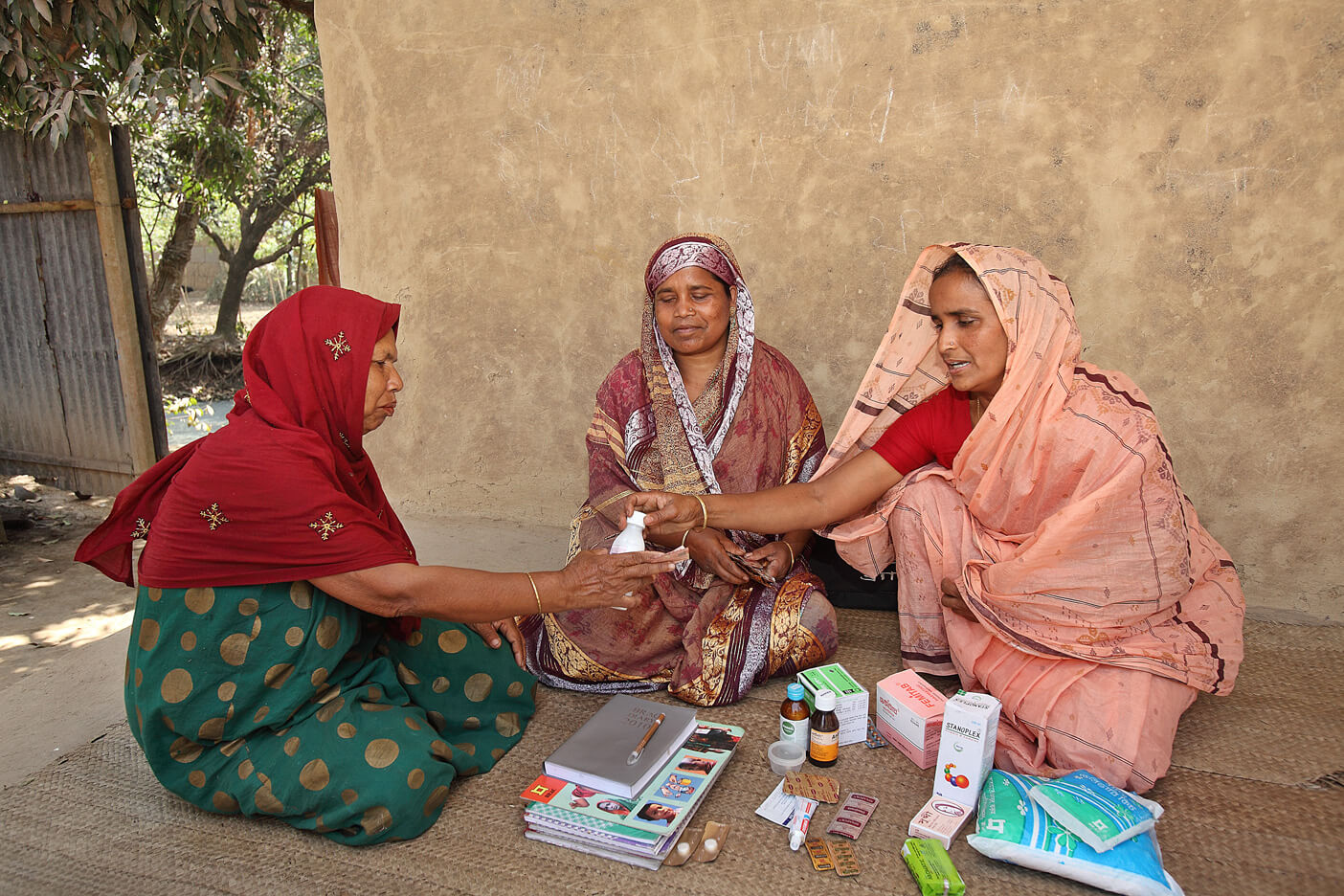 বর্তমান শতাব্দী স্বাস্থ্যক্ষেত্রে নজিরবিহীন অগ্রগতি অবলোকন করছে। উন্নত বিশ্বে সংঘটিত এই অতি চমকপ্রদ অগ্রগতিকে দুটি অংশে ভাগ করা যায়। প্রথমত যা শতাব্দীর প্রথমার্ধে অর্জিত হয়েছে এবং দ্বিতীয়ত যা পঞ্চাশের দশক থেকে সূচিত হয়েছে ।
বর্তমান শতাব্দী স্বাস্থ্যক্ষেত্রে নজিরবিহীন অগ্রগতি অবলোকন করছে। উন্নত বিশ্বে সংঘটিত এই অতি চমকপ্রদ অগ্রগতিকে দুটি অংশে ভাগ করা যায়। প্রথমত যা শতাব্দীর প্রথমার্ধে অর্জিত হয়েছে এবং দ্বিতীয়ত যা পঞ্চাশের দশক থেকে সূচিত হয়েছে ।
প্রথমার্ধে যে অগ্রগতি হয়েছে তার পেছনে উন্নত জীবনযাপনের জন্য সামাজিক উদ্যোগের অবদান রয়েছে। এ সাফল্যে অর্থনৈতিক উন্নতি ও শিক্ষার গুরুত্বপূর্ণ ভূমিকা ছিল। তবে দুধ পাস্তুরিতকরণ, ক্লোরিন ট্যাবলেট দিয়ে পানি শোধন, দাঁতের স্বাস্থ্যের জন্য ফ্লোরাইড ব্যবহার, উন্নত পয়ঃনিষ্কাশন ব্যবস্থা, সুষম খাদ্যগ্রহণের প্রয়োজনীয়তা উপলব্ধি, টিকাগ্রহণ, বিলম্বে গর্ভধারণ, খাদ্যে ভিটামিন ও আয়োডিন সংযুক্তি, প্রসবপূর্ব যত্ন, খাদ্য সংরক্ষণ শিক্ষা— এই সকল ব্যবস্থার অবদান তার চেয়ে কম নয়। ওপরে উল্লিখিত প্রতিটি ব্যবস্থা প্রয়োগের পর তা নিয়ে পরীক্ষা-নিরীক্ষা হয়েছে। প্রয়োগকৌশল পরিবর্তন করা হয়েছে এবং বিতর্কও উঠেছে। কিন্তু শতাব্দীর মাঝামাঝিতে ওপরে উল্লিখিত অধিকাংশ বিধিই শিল্পোন্নত দেশে নিয়মিত অনুশীলন করা হয়েছে। এখানে উল্লেখ করা যেতে পারে যে, অভিজ্ঞ ও মৌলিক বিজ্ঞানের জ্ঞানসম্পন্ন ব্যক্তিবর্গ, কমিউনিটিতে কর্মরত প্রোগ্রাম ম্যানেজার, রোগতত্ত্ববিদ, হাসপাতালের চিকিৎসক এবং অন্যরা এই উভয় গোষ্ঠীর মানুষের মধ্যে ঘনিষ্ঠ যোগাযোগ স্থাপন ও একযোগে কাজ করার ফলেই এই অগ্রগতি অর্জিত হয়েছে। কিন্তু দ্বিতীয় মহাযুদ্ধের পরপরই মনোযোগ অন্যদিকে ধাবিত হয়। ভেষজ বিজ্ঞান ও শল্য চিকিৎসায় নতুন অগ্রগতি এবং এন্টিবায়োটিকের মতো আশ্চর্য ওষুধ আবিষ্কারের ফলে এই মনোযোগ জনস্বাস্থ্যে দিক থেকে রোগ উপশম কার্যে (curative service ) চলে যায়। নতুন নতুন হাসপাতাল ও মেডিকেল স্কুল খোলা হয় এবং বড় বড় ওষুধ কারখানা গজিয়ে ওঠে। কার্যত মেডিকেল শিক্ষা পাঠ্যক্রম থেকে রোগ প্রতিরোধক বিষয় বাদ দেওয়া হয় এবং সরকারি স্বাস্থ্যনীতিতে জনস্বাস্থ্যের বিষয়টি কম গুরুত্ব পেতে থাকে।
কিন্তু দ্বিতীয় মহাযুদ্ধের পরপরই মনোযোগ অন্যদিকে ধাবিত হয়। ভেষজ বিজ্ঞান ও শল্য চিকিৎসায় নতুন অগ্রগতি এবং এন্টিবায়োটিকের মতো আশ্চর্য ওষুধ আবিষ্কারের ফলে এই মনোযোগ জনস্বাস্থ্যে দিক থেকে রোগ উপশম কার্যে (curative service ) চলে যায়। নতুন নতুন হাসপাতাল ও মেডিকেল স্কুল খোলা হয় এবং বড় বড় ওষুধ কারখানা গজিয়ে ওঠে। কার্যত মেডিকেল শিক্ষা পাঠ্যক্রম থেকে রোগ প্রতিরোধক বিষয় বাদ দেওয়া হয় এবং সরকারি স্বাস্থ্যনীতিতে জনস্বাস্থ্যের বিষয়টি কম গুরুত্ব পেতে থাকে।
এ সবই ঘটেছে শিল্পোন্নত দেশগুলোতে। কিন্তু উন্নয়নশীল দেশগুলোতে কি ঘটেছে ? চল্লিশের দশকের শেষভাগে বা পঞ্চাশের দশকে স্বাধীনতাপ্রাপ্ত এই দেশগুলোর একমাত্র কাজ ছিল শিল্পোন্নত দেশে প্রচলিত রোগ নিরাময় মডেল অনুসরণ করা। আশ্চর্য হওয়ার কিছুই নেই যে ওই রোগনিরাময় মডেল উন্নয়নশীল দেশগুলোতে চালু করা হয়েছিল। সারকথা হলো গ্রামভিত্তিক জনস্বাস্থ্য উন্নয়নের পর্যায়টি এড়িয়ে যাওয়া হয়েছে। হাসপাতাল নির্মাণ, রোগনিরাময় বিষয়ে ডাক্তারদের ট্রেনিং দেওয়া— যা নিরাময়ভিত্তিক (curative) ব্যবস্থাকে সমর্থন জোগায় তা অগ্রাধিকার পেতে থাকে। রোগ প্রতিরোধক ওষুধ এবং রোগতত্ত্ব ভালোভাবে পড়ানো হয় না। যাও পড়ানো হয় তা মেডিকেল কলেজগুলোতেই পড়ানো হয়।
উদাহরণ সহকারে এই নীতির অশুভ ফলাফল দেখানো যায়। একটি উদাহরণ দিই। টিকা প্রদান অত্যন্ত স্বল্পব্যয়ের প্রতিরোধমূলক ব্যবস্থা, যদিও ১৯৭৯ সালে সম্প্রসারিত টিকাদান কর্মসূচি গ্রহণ করা হয়েছে। তথাপি ১৯৮৪ সালে ২ শতাংশের কম শিশু স্বল্পব্যয়ের ও পরীক্ষিত ডিপথেরিয়া, লতাকাশ, ধনুষ্টংকার, হাম ও পোলিও রোগের টিকা নিয়েছে। অথচ এই রোগগুলো শিশুমৃত্যুর প্রধান কারণ। রোগপ্রতিরোধ ব্যবস্থার বর্তমান অবকাঠামো খুবই নড়বড়ে। গ্রামভিত্তিক স্বাস্থ্যসেবা সম্পর্কে জানাশোনাও কম। রোগের প্রাদুর্ভাব লিপিবদ্ধ করা এবং জন্ম-মৃত্যুর রেজিস্ট্রি করার কথা আছে কিন্তু সে তথ্য জানা যায় না। গ্রামভিত্তিক রোগের প্রাদুর্ভাব সম্পর্কে আগ্রহ পরিলক্ষিত হয় না।
এটি পরিষ্কার যে আমাদের স্বাস্থ্যব্যবস্থা নির্মাণে আমরা শিল্পোন্নত দেশগুলোকে অনুসরণ করার চেষ্টা করছি। কিন্তু ওই দেশগুলো শতাব্দির প্রথমার্ধে যে কাজটুকু করেছিল, আমরা তা পাশ কাটিয়ে এসেছি। টেকসই উন্নয়নের জন্য আমাদের সেই প্রাথমিক কাজটুকু করতে হবে।  গবেষণা গুরুত্বপূর্ণ কেন?
গবেষণা গুরুত্বপূর্ণ কেন?
গবেষণাকে মনে করা হয় সমস্যা সমাধানের পদ্ধতিগত চেষ্টা। এটি ৪টি মৌলিক উদ্দেশ্য সাধন করতে পারে। যথা—
ক) সমস্যা চিহ্নিতকরণ, যাচাইকরণ ও অগ্রাধিকার নির্বাচন।
খ) স্বাস্থ্যবিষয়ক নীতি, কর্মসূচি এবং প্রযুক্তি গ্রহণ ও প্রয়োগের অগ্রগতি।
গ) নতুন কৌশল ও উপায় উদ্ভাবন এবং জানার পরিধিকে এগিয়ে নিয়ে যাওয়া।
ঘ) বাস্তব সমস্যা সমাধানে গবেষণা সহায়তা করতে পারে নতুন উপায় (tool) উদ্ভাবনে এটা অত্যাবশ্যক এবং আধুনিক বিজ্ঞান ও প্রযুক্তির ক্ষমতা ও প্রতিশ্রুতি কাজে লাগাতে এটি সহায়ক। খাওয়ার স্যালাইন ডায়রিয়া চিকিৎসায় কার্যকরী বলে প্রমাণিত হয়েছে। ডায়রিয়ায় বাংলাদেশে প্রতিবছর হাজার হাজার শিশু মারা যায়।
গবেষণা এবং মাঠপর্যায়ে পরখ করার মাধ্যমে আমরা বাড়িতে বসে বাড়িতে প্রাপ্ত উপাদান দিয়ে সহজ উপায়ে সস্তা খাওয়ার স্যালাইন তৈরির পদ্ধতি পেয়েছি। তারপর এই পদ্ধতি বাংলাদেশের পল্লীর মায়েদের কাছে পৌঁছে দিয়েছি। ১৯৮০ সালে কর্মসূচির প্রথম পর্বের মূল্যায়ন করে একটি গুরুতর সমস্যা চিহ্নিত করা হয়েছে। সমস্যাটি হলো ডায়রিয়ায় আক্রান্ত ১০ শতাংশেরও কম রোগীকে খাবার স্যালাইন দিয়ে চিকিৎসা করা হয়েছে যদিও মায়েরা সঠিকভাবে স্যালাইন তৈরি জানত। পরবর্তী গবেষণায় মায়েদের এরূপ আচরণের কারণ জানা গেছে। একটি কারণ হলো স্যালাইন তৈরির একটি উপাদান গুড় সব সময় পাওয়া যায় না। তারপর চিনি ও চালের গুঁড়ো দিয়ে স্যালাইন তৈরির আরেকটি গবেষণা চালানো হলো। স্যালাইনের গ্রহণযোগ্যতা পরীক্ষার জন্যই আমরা এ গবেষণা চালাই।
১৯৮০ সালে কর্মসূচির প্রথম পর্বের মূল্যায়ন করে একটি গুরুতর সমস্যা চিহ্নিত করা হয়েছে। সমস্যাটি হলো ডায়রিয়ায় আক্রান্ত ১০ শতাংশেরও কম রোগীকে খাবার স্যালাইন দিয়ে চিকিৎসা করা হয়েছে যদিও মায়েরা সঠিকভাবে স্যালাইন তৈরি জানত। পরবর্তী গবেষণায় মায়েদের এরূপ আচরণের কারণ জানা গেছে। একটি কারণ হলো স্যালাইন তৈরির একটি উপাদান গুড় সব সময় পাওয়া যায় না। তারপর চিনি ও চালের গুঁড়ো দিয়ে স্যালাইন তৈরির আরেকটি গবেষণা চালানো হলো। স্যালাইনের গ্রহণযোগ্যতা পরীক্ষার জন্যই আমরা এ গবেষণা চালাই।
গবেষণা ও কর্ম পরিপূরক। যেখানে কর্মসূচি আজ নির্দিষ্ট কিছু লোকের স্বাস্থ্যের উন্নতির জন্য মনোনিবেশ করে সেক্ষেত্রে গবেষণা ভবিষ্যতের বৃহত্তর জনগোষ্ঠীর বহুমুখী উন্নতির জন্য একটি বিনিয়োগ ।
গবেষণা অর্থ বাঁচাতে সহায়তা করতে পারে। সমস্যার অগ্রাধিকার নির্ণয়ে এবং স্বাস্থ্যনীতি ও কর্মসূচির দক্ষতা ও কার্যকারিতা বৃদ্ধিতে গবেষণা সহায়তা করে।
প্রায়ই মনে করা হয় যে, গবেষণা হলো একটি কেতাবি ব্যাপার এবং জরুরি স্বাস্থ্যচাহিদা পূরণের সঙ্গে এর কোনো সম্পর্ক নেই। কেউ কেউ মনে করেন গবেষণা একটি বিলাসিতা যা উদ্বৃত্ত সম্পদের অধিকারীরাই শুধু করতে পারেন। অন্যরা মনে করেন গবেষণার ফলাফল খুব কমই কাজে লাগে এবং কখনও সময়মতো কোনো এনজিও বা মন্ত্রণালয়ের কাজে তা লাগানো যায় না।
অনেক দাতা সংস্থা কোনো কর্মসূচিতে অর্থ জোগান দেবার সময় গবেষণা খরচ বাদ দিয়ে দেন। এসবই গবেষণা সম্পর্কে প্রচলিত ধারণা। এভাবে গবেষণার অবদানকে দারুণভাবে অবমূল্যায়ন করা হয়েছে, যার প্রেক্ষিতে ‘উন্নয়নের জন্য স্বাস্থ্যগবেষণা কমিশন’ গঠন করা হয়েছে।
এটি একটি স্বাধীন আন্তর্জাতিক প্রয়াস এবং এতে স্বাস্থ্য ও উন্নয়ন বিষয়ে অনেক দক্ষ ও অভিজ্ঞ ব্যক্তিত্ব রয়েছেন। হার্ভার্ড বিশ্ববিদ্যালয়ে এই কমিশনের একটি ক্ষুদ্র কিন্তু দক্ষ সচিবালয় রয়েছে এবং কমিশনের প্রধান হচ্ছেন অধ্যাপক লিঙ্কন চেন। তিনি আজ আমাদের মধ্যে উপস্থিত আছেন।
স্বাস্থ্য ও উন্নয়ন প্রচেষ্টায় সহায়তার জন্য এই কমিশন দু'ধরনের গবেষণা চিহ্নিত করেছে–
ক) অতি প্রয়োজনীয় স্বাস্থ্যতথ্য ও গবেষণা এবং
খ) অগ্রাধিকার নির্ণয় করে আন্তর্জাতিক স্বাস্থ্যগবেষণা।
এই কর্মশালার উদ্দেশ্য হলো— এই অঞ্চলের উন্নয়নশীল দেশগুলোর জাতীয় অত্যাবশ্যক স্বাস্থ্যবিষয়ক তথ্য ও গবেষণার ব্যাপারে আলোচনা করা এবং আপনাদের বিশেষজ্ঞ মতামত চাওয়া।
বর্তমানে জ্ঞান ও প্রযুক্তির সৃষ্টিশীল প্রয়োগের মাধ্যমে অধিকাংশ উন্নয়নশীল দেশে অনেক কিছুই অর্জিত হতে পারে। বাংলাদেশসহ প্রতিটি দেশেরই প্রয়োজন হলো স্বাস্থ্যসমস্যা চিহ্নিতকরণ, সমাধানে অগ্রাধিকার নির্বাচন এবং নিজ পরিবেশের উপযোগী স্বাস্থ্যনীতি ও কর্মসূচি প্রণয়ন করা।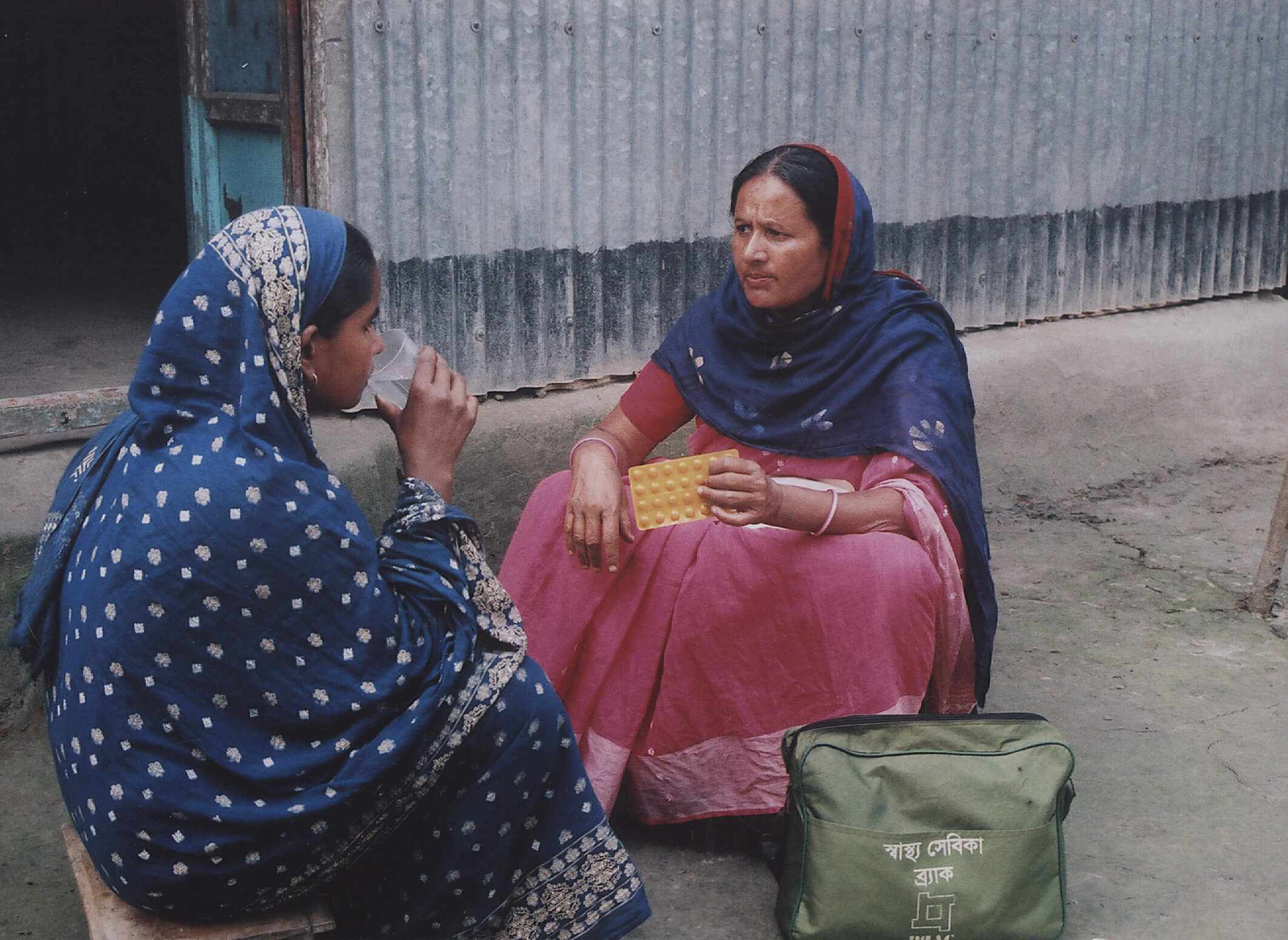 দেশবাসীর স্বাস্থ্য সমস্যার সমাধানে দেশের সম্পদ একত্র করতে হবে, বর্তমান স্বাস্থ্যবিষয়ক জ্ঞান ও প্রযুক্তির সর্বাধিক ব্যবহার করতে হবে অধিক ফললাভের জন্য। বুদ্ধিদীপ্ত ও পরীক্ষামূলক কাজ নিরলসভাবে চালিয়ে যেতে হবে।
দেশবাসীর স্বাস্থ্য সমস্যার সমাধানে দেশের সম্পদ একত্র করতে হবে, বর্তমান স্বাস্থ্যবিষয়ক জ্ঞান ও প্রযুক্তির সর্বাধিক ব্যবহার করতে হবে অধিক ফললাভের জন্য। বুদ্ধিদীপ্ত ও পরীক্ষামূলক কাজ নিরলসভাবে চালিয়ে যেতে হবে।
এটি করতে হলে প্রতিটি দেশের নিজস্ব গবেষণা ক্ষমতা থাকতে হবে, নিজস্ব বৈশিষ্ট্যমণ্ডিত অর্থনৈতিক, সামাজিক, রাজনৈতিক ও সাংস্কৃতিক পরিবেশের উপযোগী স্বাস্থ্যনীতি ও কর্মসূচি প্রণয়ন, পরীক্ষা এবং মূল্যায়ন করতে হবে।
এই বিষয়গুলো আলোচনার জন্য গত জানুয়ারি মাসে ঢাকায় আমরা একটি করেছিলাম প্রাথমিক সভার আয়োজন করেছিলাম। ওই সভায় স্বাস্থ্যবিষয়ক বিশিষ্ট পেশাদার ব্যক্তিগণ উপস্থিত ছিলেন এবং এই কর্মশালা তারই পরবর্তী পদক্ষেপ।
আগামী তিনদিন আমরা এই বিষয়ে আলোচনা চালাব। আশা করি, বাংলাদেশে স্বাস্থ্যগবেষণা চালাতে গ্রহণযোগ্য, আর্থিক ব্যয়ভার বহনে সক্ষম এবং সরবরাহের দিক থেকে উপযোগী ফলাফল পাব। যার প্রধান উদ্দেশ্য হচ্ছে আমাদের জনস্বাস্থ্যের উন্নয়ন।
ধন্যবাদ ।
এশিয়ান ইন্সটিটিউট অব ম্যানেজমেন্টের এমডিএম কোর্সের সমাবর্তন অনুষ্ঠানে স্যার ফজলে হাসান আবেদের ভাষণ
৭ই জুলাই ১৯৯০ ফিলিপাইনের রাজধানী ম্যানিলায় এশিয়ান ইন্সটিটিউট অব ম্যানেজমেন্টের এমডিএম কোর্সে অংশগ্রহণকারী সর্বপ্রথম দলের সমাবর্তন অনুষ্ঠানে ব্র্যাকের তৎকালীন নির্বাহী পরিচালক স্যার ফজলে হাসান আবেদ ভাষণ দেন। এখানে সে ভাষণের বাংলা অনুবাদ প্রকাশ করা হলো।
উন্নয়ন ব্যবস্থাপনা : ব্র্যাক দৃষ্টিকোণ থেকে
আপনাদের এখানে আসতে পেরে ও কথা বলার সুযোগ পেয়ে আজ আমি খুবই আনন্দিত। উন্নয়ন আমার বৃত্তি ও চর্চার ক্ষেত্র, আর তাই আমি যা বলব তার সঙ্গে ব্র্যাকের কাজ, অভিজ্ঞতা ও অন্তর্দর্শনের একটি সম্পর্ক থেকেই যাবে।
 বাংলাদেশ ও ব্র্যাকের ওপর ক্ষুদ্র ভূমিকা রেখে আমি আমার বক্তব্য শুরু করতে চাই। আপনারা জানেন, বাংলাদেশ পৃথিবীর সবচেয়ে দরিদ্র দেশগুলোর একটি, যার মাথাপিছু জাতীয় আয় হচ্ছে ১৬০ মার্কিন ডলার। শতকরা প্রায় ৮০ ভাগ মানুষ দারিদ্র্যসীমার নিচে বাস করে এবং একইসঙ্গে এরা অশিক্ষার অন্ধকারে নিমজ্জিত। শিশু ও মায়েদের মৃত্যুহার শোচনীয়ভাবে বেশি এবং শতকরা ৬০ ভাগ শিশু পুষ্টিহীনতায় ভোগে। এই নির্মম চিত্রকে সামনে রেখেই সরকারি ও বেসরকারি সংস্থাগুলো গ্রামীণ দরিদ্রদের লক্ষ্য করে তাদের উন্নয়নমূলক কর্মসূচির উদ্যোগ গ্রহণ করে। ব্র্যাকের নিজস্ব প্রয়াসও এমনিতর চিন্তা থেকে উৎসারিত। ব্র্যাক ইতিমধ্যে জাতীয় পর্যায়ের একটি বৃহত্তম বেসরকারি সংস্থা হিসেবে গড়ে উঠেছে। এর সূচনা ১৯৭২ সালের গোড়ার দিকে। যুদ্ধোত্তর বাংলাদেশে ভারত থেকে ফিরে আসা হাজার হাজার শরণার্থীদের প্রত্যাবাসন কাজ দিয়েই ব্র্যাকের যাত্রা শুরু। তারপর থেকে আমরা বহু কর্মসূচি পরিকল্পনা ও বাস্তবায়ন করেছি। যেমন : সংগঠন ও প্রাতিষ্ঠানিক ভিত্তি তৈরি, ব্যবহারিক ও প্রাথমিক শিক্ষা, আয় ও কর্মসংস্থান বৃদ্ধি, সঞ্চয় ও ঋণ, স্বাস্থ্য ও জনসংখ্যা, দক্ষতা ও মানবসম্পদ উন্নয়ন প্রশিক্ষণ ইত্যাদি। দারিদ্র্যবিমোচন এবং দরিদ্র জনগণ, বিশেষ করে সহায়হীন দুঃস্থ জনগোষ্ঠী যেমন মহিলাদের ক্ষমতার অধিকারী করে তোলা আমাদের কাজের মধ্যে এ দুটি উদ্দেশ্যই মুখ্য।
বাংলাদেশ ও ব্র্যাকের ওপর ক্ষুদ্র ভূমিকা রেখে আমি আমার বক্তব্য শুরু করতে চাই। আপনারা জানেন, বাংলাদেশ পৃথিবীর সবচেয়ে দরিদ্র দেশগুলোর একটি, যার মাথাপিছু জাতীয় আয় হচ্ছে ১৬০ মার্কিন ডলার। শতকরা প্রায় ৮০ ভাগ মানুষ দারিদ্র্যসীমার নিচে বাস করে এবং একইসঙ্গে এরা অশিক্ষার অন্ধকারে নিমজ্জিত। শিশু ও মায়েদের মৃত্যুহার শোচনীয়ভাবে বেশি এবং শতকরা ৬০ ভাগ শিশু পুষ্টিহীনতায় ভোগে। এই নির্মম চিত্রকে সামনে রেখেই সরকারি ও বেসরকারি সংস্থাগুলো গ্রামীণ দরিদ্রদের লক্ষ্য করে তাদের উন্নয়নমূলক কর্মসূচির উদ্যোগ গ্রহণ করে। ব্র্যাকের নিজস্ব প্রয়াসও এমনিতর চিন্তা থেকে উৎসারিত। ব্র্যাক ইতিমধ্যে জাতীয় পর্যায়ের একটি বৃহত্তম বেসরকারি সংস্থা হিসেবে গড়ে উঠেছে। এর সূচনা ১৯৭২ সালের গোড়ার দিকে। যুদ্ধোত্তর বাংলাদেশে ভারত থেকে ফিরে আসা হাজার হাজার শরণার্থীদের প্রত্যাবাসন কাজ দিয়েই ব্র্যাকের যাত্রা শুরু। তারপর থেকে আমরা বহু কর্মসূচি পরিকল্পনা ও বাস্তবায়ন করেছি। যেমন : সংগঠন ও প্রাতিষ্ঠানিক ভিত্তি তৈরি, ব্যবহারিক ও প্রাথমিক শিক্ষা, আয় ও কর্মসংস্থান বৃদ্ধি, সঞ্চয় ও ঋণ, স্বাস্থ্য ও জনসংখ্যা, দক্ষতা ও মানবসম্পদ উন্নয়ন প্রশিক্ষণ ইত্যাদি। দারিদ্র্যবিমোচন এবং দরিদ্র জনগণ, বিশেষ করে সহায়হীন দুঃস্থ জনগোষ্ঠী যেমন মহিলাদের ক্ষমতার অধিকারী করে তোলা আমাদের কাজের মধ্যে এ দুটি উদ্দেশ্যই মুখ্য।
উন্নয়নে ব্যবস্থাপনার ভূমিকা যথোপযুক্ত প্রতিবেশ তৈরি
আমি এখন আমার বক্তব্যের মূল প্রসঙ্গ উন্নয়ন ব্যবস্থাপনার প্রতি আলোকপাত করতে চাই। আমার কাছে উন্নয়ন ব্যবস্থাপনা বিষয়টিকে অন্য যে কোনো ধরনের ব্যবস্থাপনা থেকে আলাদা বলে মনে হয়। এমনি ব্যবস্থাপনার যেরকম চাহিদা, উন্নয়ন ব্যবস্থাপনার চাহিদা যেন তার চাইতে আরেকটু বেশি। আমরা যদি বুঝতে পারি উন্নয়ন কীভাবে সংঘটিত হয় এবং একজন ব্যবস্থাপকের উন্নয়ন বিকাশে ভূমিকাই বা কি তাহলে গোটা ব্যাপারটি আরও স্পষ্ট হবে।
উন্নয়ন অবশ্যই মানুষের উদ্যম ও কর্মশীলতার যোগফল। এটি এমন এক বিষয় যা মানুষ নিজেদের সক্রিয়তার মাধ্যমে সম্পাদন করে, অন্যথায় উন্নয়ন নামক কিছুই ঘটে না।
পুঁজি, প্রয়োজনীয় অবকাঠামো বা সম্পদ ইত্যাদি উন্নয়নের জন্য নিশ্চয়ই প্রয়োজন। কিন্তু এগুলোই প্রধান উপাদান নয়। প্রধান উপাদান হলো মানুষ। এটি গ্রামীণ উন্নয়ন সংঘটনের ক্ষেত্রে আরও বেশি করে সত্যি। গ্রামীণ উন্নয়ন হলো আসলে ব্যক্তিক ও সামাজিক পরিবর্তন—দৃষ্টিভঙ্গি, মূল্যবোধ, দক্ষতা, ধ্যানধারণা, প্রাতিষ্ঠানিক চেহারা ও সামগ্রিকভাবে জীবনযাপন রীতিতে যে পরিবর্তন আনা যায় তা–ই। পরিবর্তনগুলো যে খুব সহজে ঘটবে তা কিন্তু নয় এবং সময়সাপেক্ষও বটে। এগুলো যাতে মানুষের ফলপ্রসূ উদ্যোগের মধ্য দিয়ে আরও দ্রুত ঘটে সেজন্যে চাই একটি যথোপযুক্ত পরিবেশ। এ ধরনের পরিবেশ তাদের নিজেদের কাজের পরিকল্পনা, বাস্তবায়ন, পরিবীক্ষণ ও মূল্যায়ন করতে সহায়তা করে। উন্নয়ন ব্যবস্থাপকের দায়িত্ব হচ্ছে এই বিশেষ পরিবেশ তৈরি করা। তার প্রধান কর্তব্যই হচ্ছে কি করে মানুষের অংশগ্রহণে প্রাণিত ও নিশ্চিত করা যায়।
বাণিজ্যিক ব্যবস্থাপনার ভূমিকা কিছুটা অন্যরকম। এর মূল লক্ষ্য হলো লাভ। একটি বাণিজ্যিক ব্যাংকের কথাই ধরুন। সর্বসাধারণের সঞ্চিত অর্থ থেকে তহবিল গঠন করে লাভজনক ঋণদান ও আদায় একটি বাণিজ্যিক ব্যাংকের প্রাথমিক উদ্দেশ্য। পক্ষান্তরে ব্র্যাক ব্যাংক, যার মাধ্যমে আমরা আমাদের অভীষ্ট জনগোষ্ঠীর কাছে ঋণ পৌঁছে দিই, তার দায়িত্ব ঋণদানের বাইরেও প্রসারিত। উদাহরণস্বরূপ একটি হাঁসমুরগি পালন প্রকল্পের জন্যে ঋণ দিতে গিয়ে একজন ব্র্যাক ব্যবস্থাপককে নিশ্চিত হতে হয় যে, ঋণগ্রহীতা ঋণের যথাযোগ্য ব্যবহারের সামর্থ্য অর্জন করেছেন। ব্যবস্থাপককে এও লক্ষ্য রাখতে হয় যে, আবেদনের যোগ্যতার জন্য প্রয়োজনীয় অর্থসঞ্চয় খাত দলটির রয়েছে, যা কিনা সাধারণত ঋণের জন্যে আবেদনকৃত অর্থের ১০ শতাংশ। তা ছাড়া হাঁসমুরগির মৃত্যুহার রোধ করার জন্য টিকাদান সেবার ব্যবস্থা করা চাই। এ দিকগুলো সম্পর্কে যত্নবান হলে তবেই দলটি লাভজনকভাবে ঋণ ব্যবহার করতে পারে এবং হাঁসমুরগি পালন প্রকল্পও একটি দীর্ঘমেয়াদি প্রকল্প হিসেবে দাঁড়াতে পারে। এসব কিছু নিশ্চিত করা হলো একজন উন্নয়ন ব্যবস্থাপকের কাজ।
অংশগ্রহণমূলক ব্যবস্থাপনা
আমরা যারা ব্র্যাকে আছি তারা বিশ্বাস করি অংশগ্রহণমূলক ও বিকেন্দ্রীকৃত ব্যবস্থাপনা উন্নয়ন প্রক্রিয়া সাফল্যের জন্যে জরুরি। আমাদের মতো একটি দ্রুত সম্প্রসারণশীল প্রতিষ্ঠান, গ্রামীণ পরিস্থিতিতে জঙ্গমতা সৃষ্টি ও সামাজিক পরিবর্তনই যার ঈপ্সিত লক্ষ্য, তার জন্যে এ ধরনের ব্যবস্থাপনা আরও বেশি উপযোগী। আমরা মনে করি, ব্র্যাকের যেকোনো কর্মী বা সদস্য, সে যে পদেই অধিষ্ঠিত থাক না কেন, ব্যবস্থাপনা প্রক্রিয়ায় তার শরিক হওয়া প্রয়োজন। সিদ্ধান্তগ্রহণ প্রক্রিয়ায় শেকড় পর্যায়ের কর্মীদের একটি সুনির্দিষ্ট ভূমিকা, নিয়মিত ভাবনার আদানপ্রদান ও সভার মাধ্যমে আমরা রক্ষা করি। ব্র্যাকের ব্যবস্থাপনা তাই সবসময়ই অংশগ্রহণমূলক। এতে করে কর্মীদের লব্ধ শিক্ষা ও অভিজ্ঞতা যেকোনো কর্মসূচি, পরিকল্পনা ও নীতি নির্ধারণের ক্ষেত্রে রসদ হিসেবে কাজ করে। ব্র্যাকে এ ধরনের ব্যবস্থাপনার প্রসার কীভাবে হয়, তা বোঝানোর জন্যে দৃষ্টান্তসহ আমি আরও কিছু কথা যোগ করতে চাই।
 সারাদেশে বিভিন্ন অঞ্চলে চার হাজার কর্মীর পরিচালনায় আমাদের অনেকগুলো কর্মসূচি রয়েছে। যদিও আমাদের প্রতিষ্ঠানের সাংগঠনিক কাঠামো উল্লম্ব বা অনুভূমিকভাবে দেখানো যায়, তবু ব্যবস্থাপনা প্রক্রিয়ায় কর্মীদের অংশগ্রহণের যথেষ্ট সুযোগ রয়েছে। ইচ্ছে করেই সেজন্য আমরা আমাদের কার্যক্ষেত্রের ইউনিট ছোট রেখেছি। ব্র্যাক কর্মসূচির কার্যক্ষেত্রের ইউনিট হলো এলাকা অফিস যেখানে ৬ থেকে ৮ জন কাজ করেন। একটি নির্দিষ্ট পরিসীমার মধ্যে, যা আবার তারা নিজেরাই নির্ধারণ করে নেন, কার্যক্ষেত্রসংক্রান্ত সব সিদ্ধান্ত নেওয়ার স্বাধীনতা তাদের রয়েছে। একথা সত্যি যে, ব্র্যাক একটি বৃহৎ প্রতিষ্ঠান, কিন্তু এই ছোট ইউনিটগুলোর ব্যবস্থাপনাই তার একান্ত ভিত্তি।
সারাদেশে বিভিন্ন অঞ্চলে চার হাজার কর্মীর পরিচালনায় আমাদের অনেকগুলো কর্মসূচি রয়েছে। যদিও আমাদের প্রতিষ্ঠানের সাংগঠনিক কাঠামো উল্লম্ব বা অনুভূমিকভাবে দেখানো যায়, তবু ব্যবস্থাপনা প্রক্রিয়ায় কর্মীদের অংশগ্রহণের যথেষ্ট সুযোগ রয়েছে। ইচ্ছে করেই সেজন্য আমরা আমাদের কার্যক্ষেত্রের ইউনিট ছোট রেখেছি। ব্র্যাক কর্মসূচির কার্যক্ষেত্রের ইউনিট হলো এলাকা অফিস যেখানে ৬ থেকে ৮ জন কাজ করেন। একটি নির্দিষ্ট পরিসীমার মধ্যে, যা আবার তারা নিজেরাই নির্ধারণ করে নেন, কার্যক্ষেত্রসংক্রান্ত সব সিদ্ধান্ত নেওয়ার স্বাধীনতা তাদের রয়েছে। একথা সত্যি যে, ব্র্যাক একটি বৃহৎ প্রতিষ্ঠান, কিন্তু এই ছোট ইউনিটগুলোর ব্যবস্থাপনাই তার একান্ত ভিত্তি।
সর্বত্রচারী মূল্যবোধ সৃষ্টি
একটি উন্নয়ন প্রতিষ্ঠানের মূল্যবোধগুলোকে যদি সকলের মধ্যে চারিত করা যায়, তবে ব্যবস্থাপনায় সেগুলো উল্লেখযোগ্য ভূমিকা রাখতে পারে। ব্র্যাক আদ্যোপান্ত সুনিশ্চিত কিছু বিশ্বাসের সৃষ্টি ও লালন করে এসেছে। মানুষের সৃজনক্ষমতার যে অযুত সম্ভাবনা রয়েছে এ বিশ্বাসকে আমরা সব ব্র্যাককর্মী ও অভীষ্ট জনগোষ্ঠীর ভেতর ছড়িয়ে দিয়েছি। আমরা মনে করি প্রতিটি ব্যক্তি, সমাজে তার অবস্থান যাই হোক না কেন, উন্নয়ন প্রক্রিয়ায় অবদান রাখতে পারেন। শিশুর ডায়রিয়া হলে জলশূন্যতা রোধে আমাদের মায়েরা নিজ হাতে স্যালাইন চিকিৎসা করতে সক্ষম, এ নিয়ে বিশ্ব স্বাস্থ্য সংস্থাসহ আরও অনেকে সত্তরের শেষভাগেও যখন দ্বিধান্বিত, তখন আমরা বাড়িতেই পাওয়া যায় এমন কয়েকটি উপাদান দিয়ে মায়েদের স্যালাইন তৈরি শেখানোর সিদ্ধান্ত নিই। আমরা যে সঠিক সিদ্ধান্ত নিয়েছিলাম, ইতিহাস সে কথা প্রমাণ করেছে। বাংলাদেশে এখন সব মায়েরাই জানেন কি করে ঘরে বসে খাওয়ার স্যালাইন তৈরি করা যায়।
কাজের নৈতিক পরিমণ্ডলকে ব্র্যাক সবসময়ই গুরুত্ব দিয়ে এসেছে। কাজের সময় আমরা এমন একটি অকৃত্রিম পরিবেশ তৈরি করতে চেষ্টা করি, যাতে সকল কর্মীই তাদের একান্ত পরিশ্রম যে মানুষের কল্যাণের জন্যে তা অনুভব করতে পারেন। এ জাতীয় প্রাতিষ্ঠানিক বিশ্বাস আমাদের ব্যবস্থাপনার প্রকৃতিকে কিছুটা স্বতন্ত্র করে তোলে।
নিয়ত শিক্ষা গ্রহণ : গবেষণার ভূমিকা
একজন উন্নয়ন ব্যবস্থাপককে প্রতিনিয়তই তার কার্যক্ষেত্র থেকে শিক্ষাগ্রহণ করতে হয়। কাজের প্রগতি কিংবা অনগ্রসরতা, শক্তি অথবা দুর্বলতা, তার অধীনস্তদের কর্মকুশলতা, গোটা কর্মসূচির বিস্তৃতি ও প্রভাব ইত্যাদি অনেক বিষয়েই প্রতিদিন তাকে নতুন করে শিখতে হয়। এ শেখার সবচাইতে নির্ভরযোগ্য সূত্র হলো পক্ষপাতশূন্য গবেষণা ও মূল্যায়ন। আমরা তাই আমাদের নিজেদের একটি গবেষণা ও মূল্যায়ন বিভাগ স্থাপন করেছি। আমাদের গবেষণা একবারই সম্পাদ্য কোনো ব্যাপার নয়। বরঞ্চ এটি এক নিরন্তর প্রক্রিয়া। গবেষণাকর্মের গুণেই আমরা সবসময় আমাদের লক্ষ্যকে নতুন করে সংজ্ঞায়িত এবং সঙ্গেসঙ্গে কাজের পরিধি বৃদ্ধি ও প্রকল্পগুলোর দীর্ঘমেয়াদি রূপ দিতে পেরেছি।
আমাদের অভিজ্ঞতা বলে একজন সফল উন্নয়ন ব্যবস্থাপক সে-ই যিনি তার নিজের ব্যর্থতা থেকে শেখেন। আর তার সিদ্ধান্তগুলোর পেছনে কাজ করে গবেষণা থেকে পাওয়া তথ্য।
কর্মকুশলতা
শেষ করার আগে আমি আরেকবার জোর দিয়ে বলব যে, উন্নয়ন হলো একটি সত্যিকারের জটিল কাজ এবং এর ব্যবস্থাপনা যা সচরাচর মনে করা হয়ে থাকে তার চেয়েও বেশি দুরূহ। গ্রামীণ উন্নয়ন এখন আর কোনো শখের কাজ নয়। এটি একটি পেশাদার কাজ এবং এ কাজে সফল হওয়ার জন্য প্রয়োজন বিশেষ নৈপুণ্য ও যোগ্যতা। উন্নয়ন ব্যবস্থাপকদের উন্নয়নের অন্তর্নিহিত অর্থ এবং এর রাজনৈতিক অর্থনীতি বিষয়ে বোঝার আগ্রহ ও ক্ষমতা থাকতে হবে। সেজন্য তাদের দক্ষতা বৃদ্ধিমূলক প্রশিক্ষণ এবং কাজের মধ্য দিয়ে সার্বক্ষণিক শিক্ষা গ্রহণের প্রয়োজন। আমরা সেভাবেই আমাদের ভবিষ্যৎ ব্যবস্থাপকদের গড়ে তুলছি, যাতে করে তারা তাদের সামনের দায়িত্ব যথাযোগ্য নিষ্ঠা ও দক্ষতা সহযোগে নিখুঁতভাবে সম্পন্ন করতে পারেন। উন্নয়নে কর্মকুশলতার কোনো বিকল্প নেই।
ভদ্রমহিলা ও মহোদয়,
আপনাদের এই এমডিএম কোর্স নিশ্চয়ই সাফল্যের সঙ্গে শেষ হয়েছে। আমি আশা করি, এই কোর্স আপনাদের সার্বিক দক্ষতা ও মানবিক উদ্দীপনা নিয়ে আসন্ন দায়িত্ব পালনে সাহায্য করবে। আজকের বিদায় বেলায় আপনাদের সবার শুভ কামনা করছি। আজ সন্ধ্যায় এই সম্ভাষণ জানানোর জন্যে আমন্ত্রিত হওয়ায় আমি আরেকবার এশিয়ান ইনস্টিটিউট অব ম্যানেজমেন্টকে ধন্যবাদ জানাচ্ছি। উন্নয়ন ব্যবস্থাপনার মতো সহজে অধিগম্য নয় এমন এক বিষয়ে আরো অনেককে প্রশিক্ষিত করার কাজ এশিয়ান ইনস্টিটিউট অব ম্যানেজমেন্ট অব্যাহত রাখবেন এই আমাদের প্রত্যাশা। আপনাদের সবাইকে ধন্যবাদ।
অ্যালানশন ফেইনস্টেইন ওয়ার্ল্ড হাঙ্গার পুরস্কার গ্রহণকালে স্যার ফজলে হাসান আবেদের ভাষণ
"প্রেসিডেন্ট ভারটান গ্রেগরিয়ান, মি. এলি উইসেল, মি. মোরলে সেফার, মি. অ্যালানশন ফেইনস্টেইন, মি. রবার্ট ক্যাটস, পুরস্কার প্রাপ্তগণ ও ভদ্রমহোদয়গণ,
আজকের সন্ধ্যায় এখানে উপস্থিত হতে পেরে আমি খুব উৎফুল্ল বোধ করছি। আমরা খুব আনন্দ সহকারে অ্যালানশন ফেইনস্টেইন ওয়ার্ল্ড হাঙ্গার পুরস্কার গ্রহণ করছি। ব্র্যাক এবং যে জনগোষ্ঠীর সঙ্গে আমরা কাজ করি, তাদের পক্ষ থেকে আমি এই পুরস্কারের জন্য ব্রাউন কর্পোরেশনের বোর্ড অব ফেলোস এর প্রতি গভীর কৃতজ্ঞতা প্রকাশ করছি। এই স্বীকৃতি আমাদের অসমাপ্ত কাজ সম্পাদনে প্রেরণার উৎস হয়ে থাকবে।
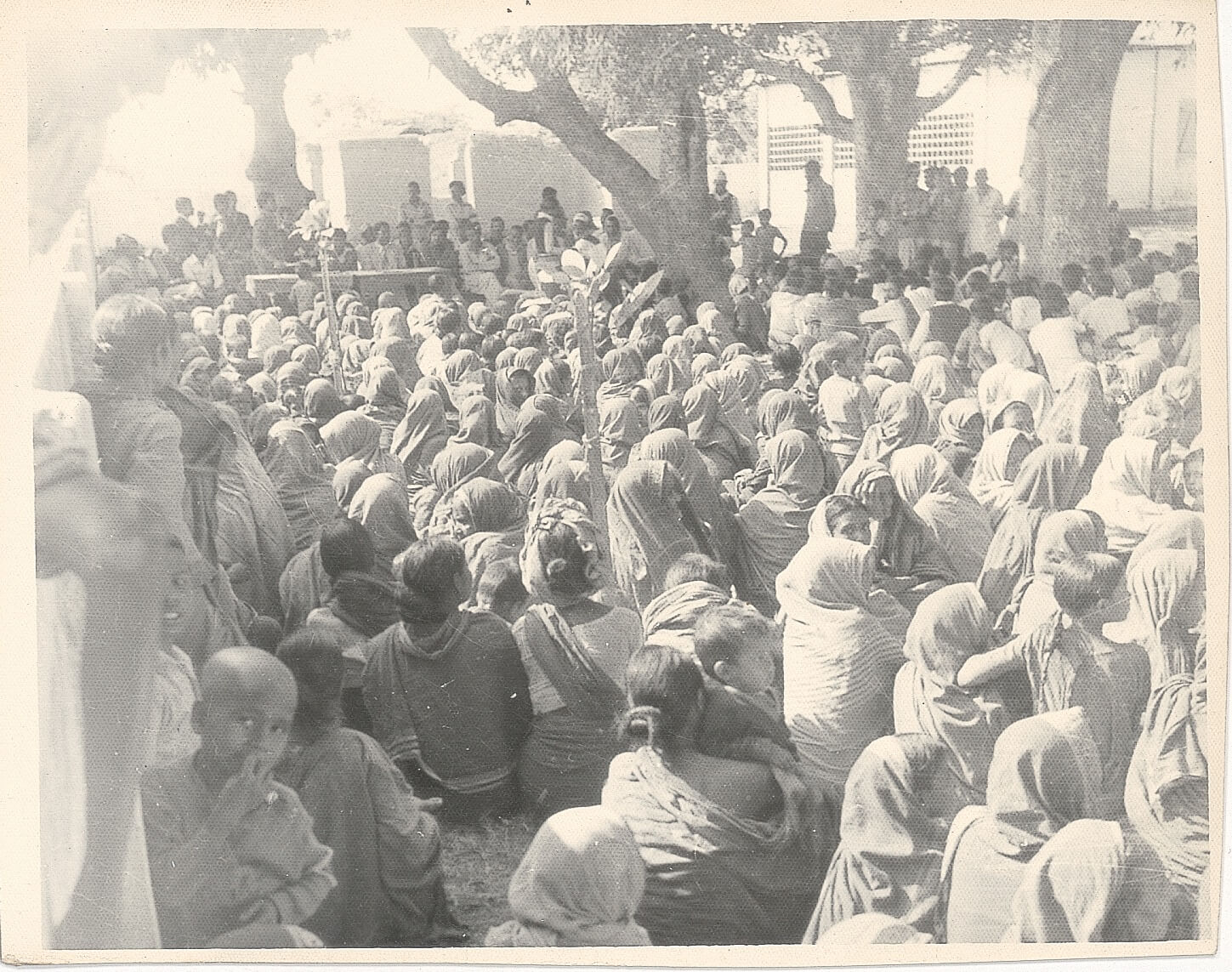 ভদ্রমহিলা ও মহোদয়গণ,
ভদ্রমহিলা ও মহোদয়গণ,
পৃথিবীর যে অংশ থেকে আমি এসেছি, সে অংশে ক্ষুধা মানুষের নিত্যসঙ্গী, দারিদ্র্য ও নিরক্ষরতা সর্বব্যাপী এবং রোগ-মৃত্যু অসংখ্য। যেখানে বঞ্চনা নিয়ম, ব্যতিক্রম নয়। বাংলাদেশ পৃথিবীর সবচাইতে স্বল্পোন্নত দেশগুলোর একটি। বাংলাদেশের আয়তন নিকারাগুয়া বা যুক্তরাষ্ট্রের উইসকনসিন অঙ্গরাজ্যের সমান কিন্তু এর জনসংখ্যা ১১ কোটি। পৃথিবীর অন্যকোনো দেশ এতটা ঘনবসতিপূর্ণ নয়। দেশের জনসাধারণ দরিদ্র। ষাট শতাংশ পরিবারের জমি নেই। এমনকি ২০ শতাংশ পরিবারের নেই বসতভিটা। জনগণের মাথাপিছু বার্ষিক আয় ১৬০ মার্কিন ডলার, ৮০ শতাংশ মানুষ দারিদ্র্যসীমার নিচে বাস করে এবং ৬০ শতাংশ মানুষ অপুষ্টিতে ভুগছে। প্রাকৃতিক দুর্যোগ একটি সাধারণ ঘটনা হয়ে দাড়িয়েছে এবং যখন আমরা আরেকটি নতুন দুর্যোগের মুখোমুখি হব, তখন আপনারা আরও দুর্ভোগের কাহিনী শুনতে পাবেন। স্বাস্থ্য পরিস্থিতিও ভালো নয়। শিশুমৃত্যুহার প্রতি হাজারে ১২০ জন, যা আপনাদের দেশের তুলনায় ১০ গুণ বেশি। ৫০ শতাংশ শিশু কম ওজন নিয়ে জন্মগ্রহণ করে। প্রসূতি মৃত্যুহার নরওয়ের তুলনায় ৩শ গুণ বেশি। মাত্র ১৫ শতাংশ মহিলা ও ২৫ শতাংশ পুরুষ লিখতে ও পড়তে সক্ষম। এসবই কঠোর পরিসংখ্যান। একবিংশ শতাব্দীতে পদার্পণ করতে আর মাত্র দশ বছর বাকি এবং এটা আমাদের সকলের জন্য লজ্জার বিষয় যে, এরকম পরিস্থিতিকে আমরা এখনও চলতে দিচ্ছি। কিন্তু এরকম অবস্থা বেশিদিন চলতে দেওয়া যাবে না।
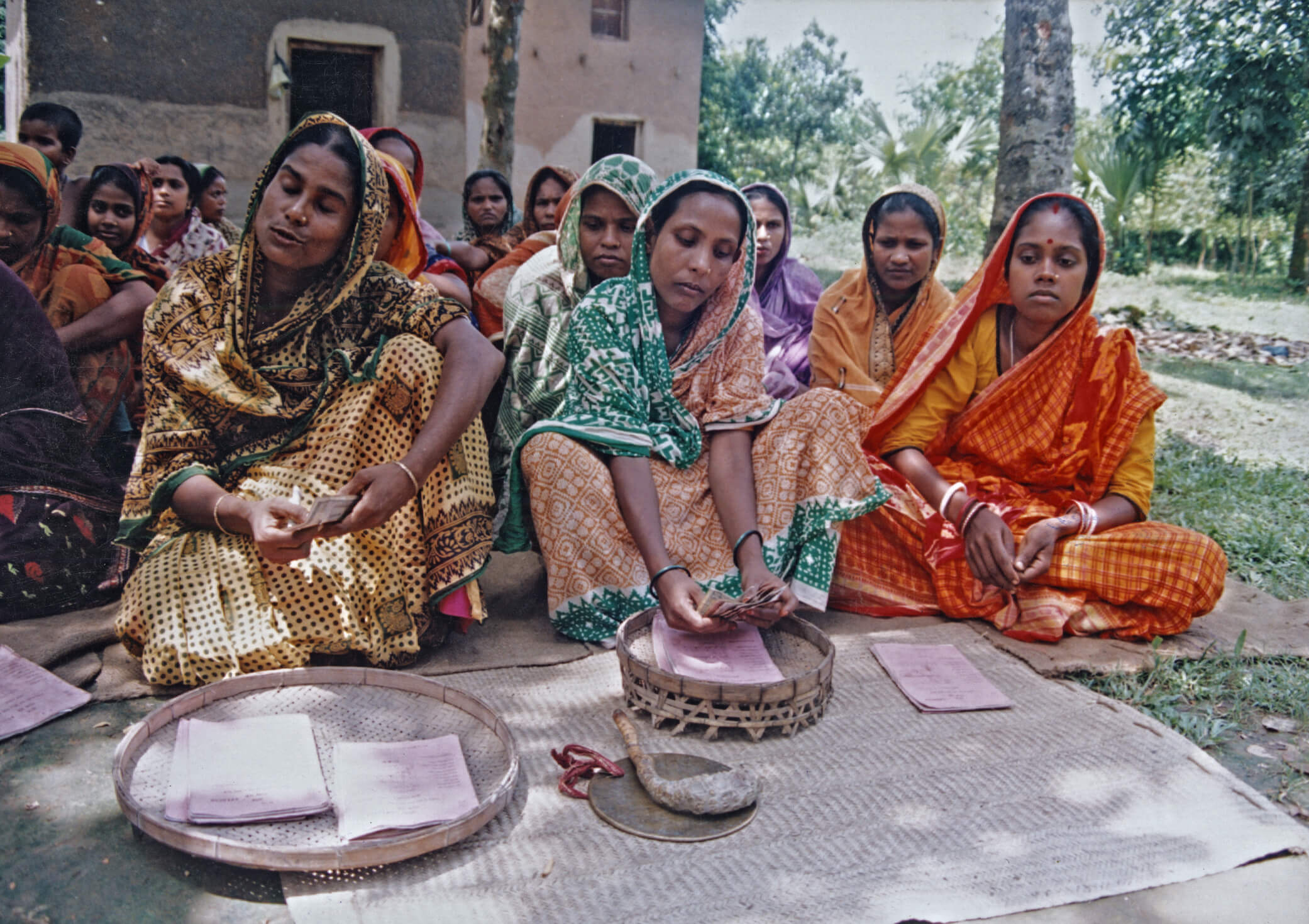 ভদ্রমহিলা ও মহোদয়গণ,
ভদ্রমহিলা ও মহোদয়গণ,
চলুন, আমরা ক্ষণিকের জন্য ইতিহাসের দিকে ফিরে তাকাই। যে সমাজে আমরা বাস করছি সে সমাজ কতিপয় কালো অধ্যায় পেরিয়ে এসেছে, যা আমাদের সভ্যতাকে কলঙ্কিত করেছে। মানুষ ওই যুগে নানা সামাজিক ব্যাধি ও কুসংস্কার, নিষ্ঠুরতা ও অভিশাপ, প্রগতিবিরোধী রীতি ও মূল্যবোধ প্রভৃতির শিকার ছিল। অবশ্য পরে তা পরিত্যক্ত হয়েছে। মহান নেতৃবৃন্দ এবং লাখো লাখো সাহসী মানুষ অসীম ধৈর্য্যসহকারে মন্দের বিরুদ্ধে লড়াই করেছেন এবং একটি ন্যায় এবং সমতাভিত্তিক সমাজ প্রতিষ্ঠা করেছেন। কয়েকটি উদাহরণ দিই—দাসপ্রথা সারাবিশ্বে এখন অভিশাপ বলেই বিবেচিত হয় অথচ ঊনবিংশ শতাব্দীর শুরুতে এটি গ্রহণযোগ্য ছিল। ১৮৩৩ সালে দাসমুক্তির আইন পাশের মাধ্যমে আপনারা ইতিহাস সৃষ্টি করেছেন। এ কাজে কোয়াকার্স (জর্জ ফক্স কর্তৃক প্রতিষ্ঠিত সংগঠন)-এর অনেক বড় অবদান রয়েছে। উপনিবেশবাদের অবস্থাও তাই। সাবেক উপনিবেশগুলোতে মহাত্মা গান্ধীর মতো ব্যক্তিদের নেতৃত্বে উপনিবেশবিরোধী আন্দোলনের ফলে এ শতাব্দীর মধ্যভাগে উপনিবেশবাদ ঘৃণ্য ও অচল হয়ে যায়। আপনাদের সাহসী স্বাধীনতাপ্রিয় পূর্বপুরুষেরা এক্ষেত্রে অনেকটা অগ্রসৈনিকের ভূমিকা পালন করেছিলেন। একইভাবে যদিও জাতিভেদ ও বর্ণপ্রথা এখনও বিলুপ্ত হয়নি, তথাপি এটি মানব সমাজের কাছে গ্রহণযোগ্য নয় এবং আশা করা যায় সহসা তা বিলুপ্ত হবে। মার্টিন লুথার কিংসহ লক্ষ লক্ষ মানুষের আত্মদানকে আমরা কৃতজ্ঞতার সঙ্গে স্মরণ করি, যারা বর্ণবাদের বিরুদ্ধে লড়েছেন। কিন্তু ভদ্রমহিলা ও মহোদয়গণ, ক্ষুধা, রোগ বা নিরক্ষরতা যা আমাদের সমাজকে এখনও অচল করে রেখেছে ও লাখ লাখ মানুষকে শৃঙ্খলিত করে রেখেছে, সে ব্যাপারে কী করা হয়েছে? এ লজ্জা আমাদের সকলের। মানবজাতি এবং আমাদের সভ্যতার জন্য এটি অভিশাপ। কোনো প্রতিবিধান ছাড়া এটি চলতে থাকবে তা কিন্তু হতে পারে না।
 ভদ্রমহিলা ও মহোদয়গণ,
ভদ্রমহিলা ও মহোদয়গণ,
এখন আমাদের ঘোষণা করার সময় এসে গেছে যে, দাসপ্রথা, উপনিবেশবাদ এবং বর্ণপ্রথার মতো দারিদ্র্য ও নিরক্ষরতাও গ্রহণযোগ্য নয়। আমাদের অবশ্যই মানবিক মূল্যবোধ, প্রজ্ঞা ও বিবেককে ঊর্ধ্বে তুলে ধরতে হবে। আধুনিক বিজ্ঞান ও প্রযুক্তি উন্মুক্ত করে দিয়েছে বিশাল জ্ঞানভাণ্ডার এবং সুযোগ যা তা এই গ্রহের প্রতিটি মানুষের জীবনকে সমৃদ্ধ করতে পারে। আমাদের অবশ্যই চেষ্টা করতে হবে যাতে এই পৃথিবীর সকল মানুষ বিজ্ঞান ও সভ্যতার ফল সমভাবে ভোগ করতে পারে এবং রোগ, অন্ধকার ও নিদারুণ দারিদ্র্যের মাঝে ধুঁকে ধুঁকে না মরে। ব্র্যাকে আমরা সে লক্ষ্যেই কাজ করছি, আমরা আমাদের জনগোষ্ঠীর বিশেষ করে সমাজের দরিদ্র ও অবহেলিত জনগোষ্ঠীর সামাজিক ও অর্থনৈতিক মুক্তির চেষ্টা করছি।
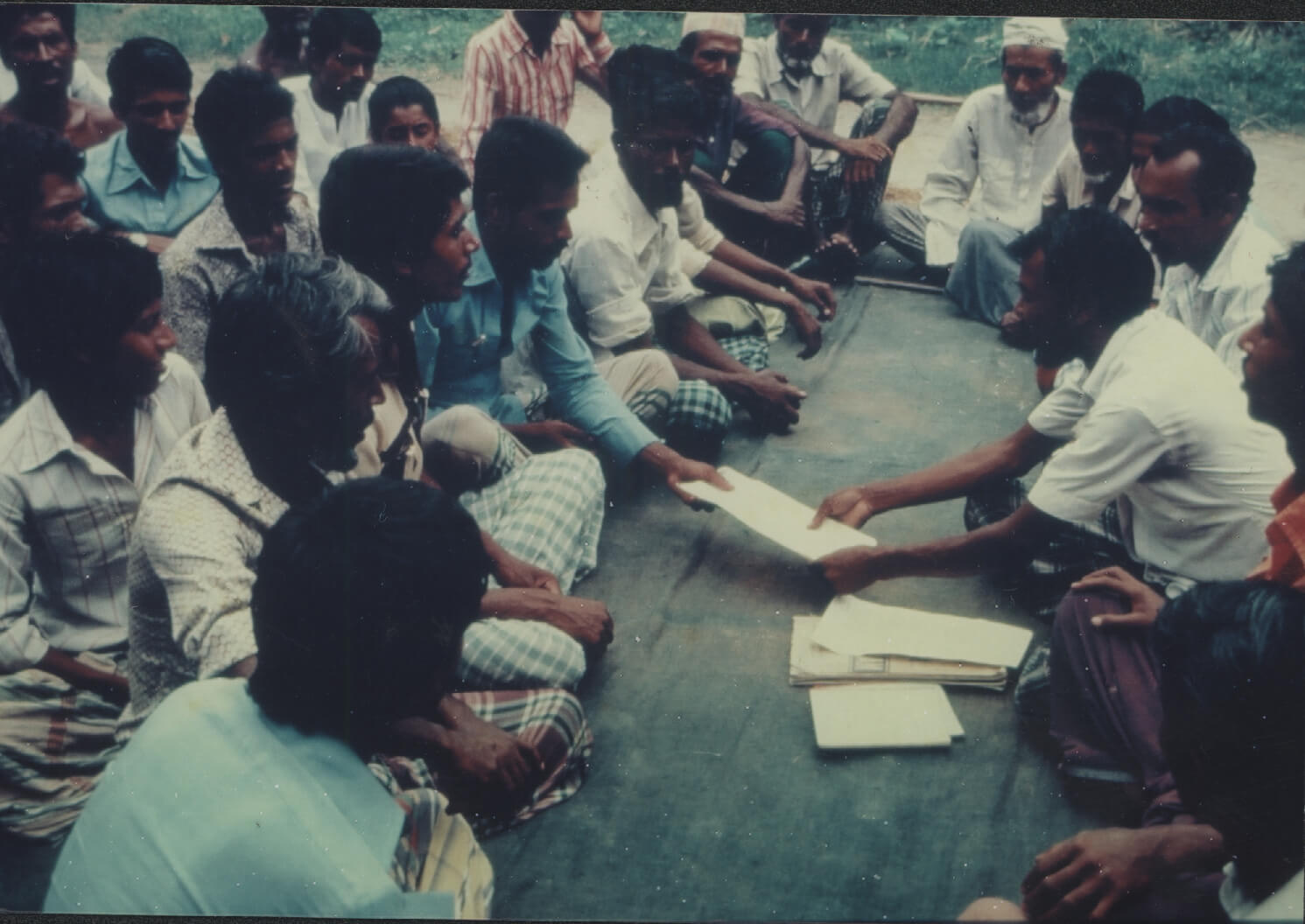 এক মানবিক প্রয়োজনের তাগিদ থেকে ১৯৭২ সালে ব্র্যাকের জন্ম হয়। সহসা আমরা বুঝতে পারলাম, যে পল্লিবাসীদের সঙ্গে আমরা কাজ করছি–তাদের শুধু রিলিফ নয়, আরও কিছু প্রয়োজন। তাদের প্রয়োজন শিক্ষা, নিরাময় ও প্রতিরোধযোগ্য স্বাস্থ্যসেবা, ঐকমত্য এবং ঋণ। ব্যবহারিক শিক্ষা এবং পেশাগত দক্ষতার জন্য প্রশিক্ষণ ও সহজ শর্তে ঋণ প্রদান প্রভৃতির মাধ্যমে ভূমিহীন ও সমাজের সুবিধাবঞ্চিত অন্য মানুষ যেমন মহিলাদের সমবায়ের ভিত্তিতে আমরা সংগঠিত করেছি। ইতিমধ্যে এভাবে আমরা পাঁচ লাখ নরনারীকে সমবায়ের মাধ্যমে সংগঠিত করছি এবং পনের মিলিয়ন ডলার বন্ধকহীন ঋণ সহজ শর্তে প্রদান করেছি। এই সেবা সমাজে তাদের মর্যাদা দিয়েছে এবং আয় ও কর্মসংস্থানের নতুন সুযোগ সৃষ্টি করছে। আমরা এই প্রচেষ্টার সম্প্রসারণ ঘটাচ্ছি এবং এই শতাব্দীর শেষে বাংলাদেশের এক-পঞ্চমাংশ গ্রাম কর্মসূচির আওতায় আসবে।
এক মানবিক প্রয়োজনের তাগিদ থেকে ১৯৭২ সালে ব্র্যাকের জন্ম হয়। সহসা আমরা বুঝতে পারলাম, যে পল্লিবাসীদের সঙ্গে আমরা কাজ করছি–তাদের শুধু রিলিফ নয়, আরও কিছু প্রয়োজন। তাদের প্রয়োজন শিক্ষা, নিরাময় ও প্রতিরোধযোগ্য স্বাস্থ্যসেবা, ঐকমত্য এবং ঋণ। ব্যবহারিক শিক্ষা এবং পেশাগত দক্ষতার জন্য প্রশিক্ষণ ও সহজ শর্তে ঋণ প্রদান প্রভৃতির মাধ্যমে ভূমিহীন ও সমাজের সুবিধাবঞ্চিত অন্য মানুষ যেমন মহিলাদের সমবায়ের ভিত্তিতে আমরা সংগঠিত করেছি। ইতিমধ্যে এভাবে আমরা পাঁচ লাখ নরনারীকে সমবায়ের মাধ্যমে সংগঠিত করছি এবং পনের মিলিয়ন ডলার বন্ধকহীন ঋণ সহজ শর্তে প্রদান করেছি। এই সেবা সমাজে তাদের মর্যাদা দিয়েছে এবং আয় ও কর্মসংস্থানের নতুন সুযোগ সৃষ্টি করছে। আমরা এই প্রচেষ্টার সম্প্রসারণ ঘটাচ্ছি এবং এই শতাব্দীর শেষে বাংলাদেশের এক-পঞ্চমাংশ গ্রাম কর্মসূচির আওতায় আসবে।
আমাদের দেশে ৭০ শতাংশ থেকে ৮০ শতাংশ ছেলেমেয়ে লেখাপড়া শেখার আগেই স্কুল ত্যাগ করে। সর্বাধিক দরিদ্র শ্রেণির যেসব ছেলেমেয়ে এভাবে স্কুল ত্যাগ করে বা কখনও স্কুলে আসে না, তাদের লেখাপড়া শেখানোর জন্য আমরা উপআনুষ্ঠানিক প্রাথমিক শিক্ষা কর্মসূচি চালু করেছি। এ কর্মসূচির প্রাথমিক সাফল্যে উৎসাহিত হয়ে আমরা ৩ হাজার ৫শ টি স্কুল খুলেছি এবং এসব স্কুলের বেশিরভাগ শিক্ষার্থী মেয়েশিশু।
যেহেতু ডায়রিয়া আমাদের সমাজে উচ্চ মৃত্যুহার ও মরণাপন্ন অবস্থার জন্য দায়ী, সেহেতু প্রতিটি ঘরে আমরা আমাদের স্বাস্থ্যকর্মীদের পাঠিয়েছি, তারা সেখানে প্রত্যেক মা-কে লবণ, গুড় ও পানি দিয়ে ঘরে বসে ডায়রিয়া চিকিৎসার স্যালাইন তৈরি শিখিয়েছে। বাংলাদেশের ১ কোটি ৩০ লাখ বাড়িতে এই স্বাস্থ্যশিক্ষা প্রদান করা হয়েছে।
কিন্তু এগুলো যথেষ্ট নয়। ভদ্রমহিলা ও মহোদয়গণ, আমাদের আরও অনেক কিছু করার বাকি আছে। আমরা এই শতাব্দীর শেষ দশকে রয়েছি কিন্তু এখনও দারিদ্র্য, অজ্ঞতা ও রোগ প্রতিকারহীন অবস্থায় চলছে। এ সকল ঘটনা পৃথিবীর এ অংশে ব্যতিক্রম নয়, এখনও নিয়ম হয়েই আছে। আমরা অবশ্যই এগুলো দূর করব, যাতে এগুলো নিয়ম না হয়ে ব্যতিক্রম হয়ে থাকে। এর প্রতিবিধানে আপনাদের সহায়তা, সমর্থন ও সহানুভূতি প্রয়োজন। আমি নিশ্চিত আপনারা আমার সঙ্গে একমত হবেন যে, এ কাজে শিল্পোন্নত ধনী দেশগুলোতে জনমত গঠনের প্রয়োজন রয়েছে।
ব্র্যাককে এ বছরের অ্যালানশন ফেইনস্টেইন ওয়ার্ল্ড হাঙ্গার পুরস্কার প্রদান করে সম্মানিত করায় আমি পুনরায় ব্রাউন ইউনিভার্সিটিকে ধন্যবাদ জানাচ্ছি। আমরা খুবই কৃতজ্ঞ।
ধন্যবাদ।"
স্যার ফজলে হাসান আবেদ
সন: ১৯৯০
রাজেন্দ্রপুরে সিডিএম-এর উদ্বোধনী অনুষ্ঠানে ব্র্যাকের তৎকালীন নির্বাহী পরিচালক ও অনুষ্ঠানের সভাপতি স্যার ফজলে হাসান আবেদের ভাষণ
সম্মানিত অতিথিবৃন্দ, ভদ্রমহিলা ও ভদ্রমহোদয়গণ,
কয়েক মুহূর্ত হলো আমাদের প্রধান অতিথি এই প্রশিক্ষণ কেন্দ্রের নাম রাখলেন সেন্টার ফর ডেভলপমেন্ট ম্যানেজমেন্ট বা উন্নয়ন ব্যবস্থাপনা কেন্দ্র। এই সুযোগে ব্র্যাকের দৃষ্টিকোন থেকে ‘উন্নয়ন' ও 'ব্যবস্থাপনা' শব্দ দুটোকে আমি সংক্ষেপে বিশ্লেষণ করতে চাই।

'উন্নয়ন' হচ্ছে জনগণের কর্মক্ষমতার ফসল। মূলতঃ এটি একটি গণমুখী পদ্ধতি। নিজেদের অর্থনৈতিক, সামাজিক ও রাজনৈতিক অবস্থার পরিবর্তনের লক্ষ্যে নারী ও পুরুষ যখন একক ও সম্মিলিতভাবে কাজ করেন কেবল তখনই এই উন্নয়ন সংঘটিত হয়। আমরা যে পরিবর্তন চাই তা অবশ্যই অর্থনৈতিকভাবে লাভজনক, রাজনৈতিকভাবে ন্যায়প্রদ, সামাজিকভাবে সৎ এবং পরিবেশগতভাবে সুপ্রসু হতে হবে।
মূলধন, সম্পদ এবং অবকাঠামোগত সুবিধা উন্নয়নের অবশ্যই প্রয়োজনীয় কিছু এগুলো হচ্ছে উন্নয়নের গৌণশর্ত। অভিভাবক যতক্ষণ পর্যন্ত না শিশুদের স্কুলে পাঠান, শিক্ষক যতক্ষণ পাঠদান না করেন এবং ছাত্র পাঠ গ্রহণ না করে ততক্ষণ স্কুল ভবন নির্মাণের কোনো সার্থকতাই প্রতিপন্ন হয়না। গ্রামের রাস্তাটি চেয়ারম্যানের বাড়িতে গিয়ে শেষ হয়েছে, সেই রাস্তা চেয়ারম্যানের জামাইকে শ্বশুরবাড়ি যেতে সহায়তা করে মাত্র, যদি না এই রাস্তা কোনো বাজারের সঙ্গে সংযোগ ঘটায়, যেখানে উৎপাদিত সামগ্রীর যথার্থ মূল্য পাওয়ার জন্য কৃষকরা যাতায়াত করতে পারেন যদি না এই রাস্তা স্বাস্থ্যকেন্দ্র কিংবা কৃষিসম্প্রসারণ কেন্দ্রের সঙ্গে সংযোগ ঘটিয়ে গ্রামীণ জনগণকে স্ব স্ব ক্ষেত্রে সেবা পেতে সহায়তা করে–তবে এই রাস্তা নির্মাণ কখনই উন্নয়নের পর্যায়ে পড়েনা।
প্রশ্ন উঠতে পারে, উন্নয়ন মানেই যদি জনগণকৃত ব্যক্তিক ও সামাজিক পরিবর্তনের একগুচ্ছ ফসল– অর্থাৎ দৃষ্টিভঙ্গি, মূল্যবোধ, দক্ষতা, ধ্যান ধারণা, সংগঠন ও জীবন-বিধি সংক্রান্ত পরিবর্তন তাহলে একজন উন্নয়ন ব্যবস্থাপকের কাজ কী? তার প্রাথমিক দায়িত্ব হচ্ছে অনুকূল পরিবেশ সৃষ্টি করে দেওয়া। এই পরিবেশই মানুষকে নিজেদের কাজের পরিকল্পনা গ্রহণ, বাস্তবায়ন, অবলোকন ও মূল্যায়নে উৎসাহিত করবে।
আমরা বিশ্বাস করি, মূল্যবোধের অংশিদারত্ব উন্নয়ন ব্যবস্থাপনার ক্ষেত্রে একটি গুরুত্বপূর্ণ ভূমিকা পালন করে। কতকগুলো মূল্যবোধের সৃষ্টি এবং পরিচর্যার জন্য একটি অবিরাম পদ্ধতির প্রয়োজন। একটি গুরুত্বপূর্ণ মূল্যবোধকে একজন ব্যবস্থাপক তার কর্মী এবং জনগণের মাঝে সঞ্চারিত করে দিতে পারেন। প্রতিটি মানুষের মধ্যে এই সৃজনধর্মিতা ক্রিয়াশীল। তিনি যে সমাজে বাস করেন আপন মর্যাদা অনুযায়ী তিনি সে সমাজে এই মূল্যবোধ চারিয়ে দেওয়ার ক্ষমতা রাখেন।
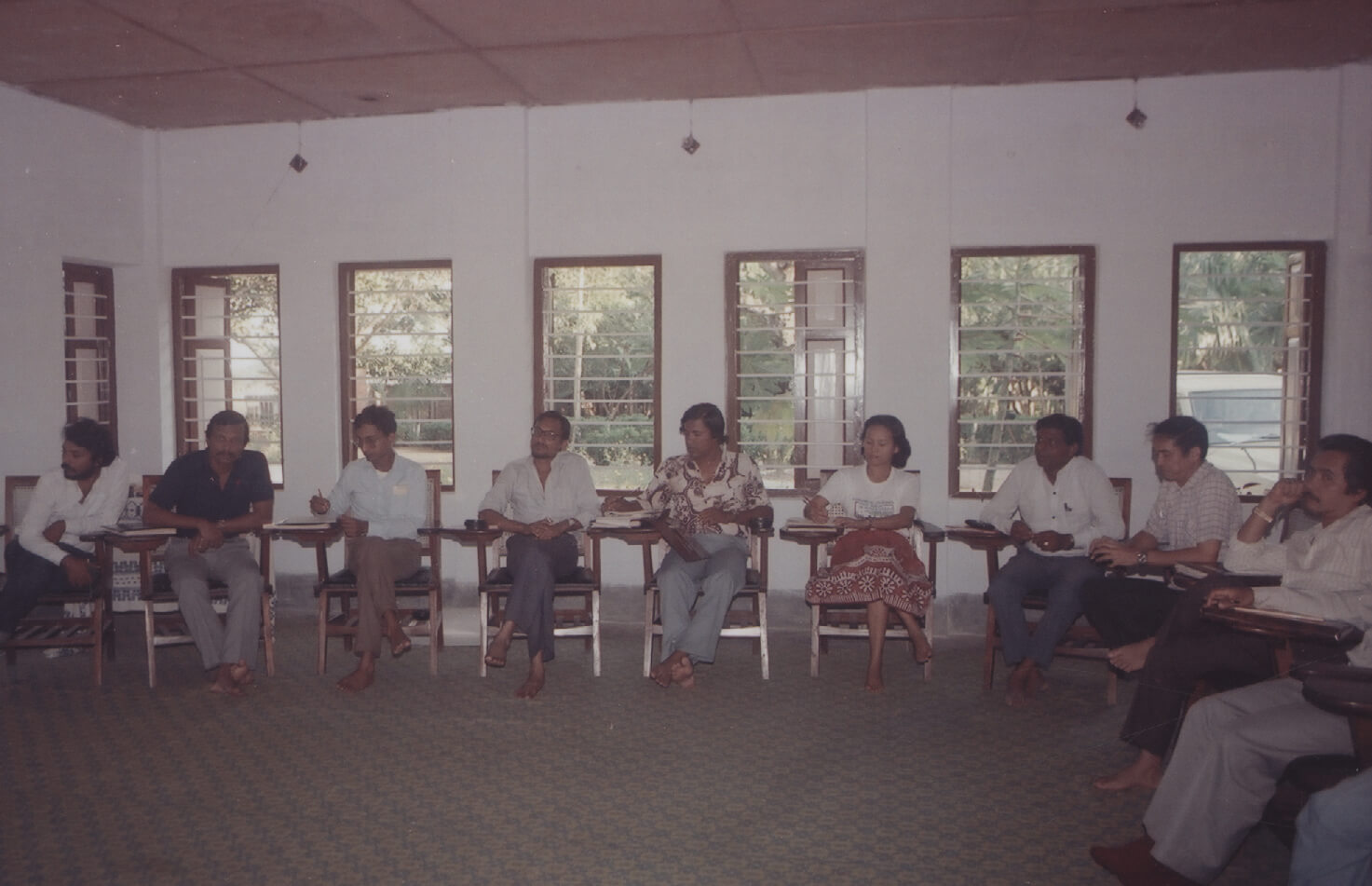
একজন উন্নয়ন ব্যবস্থাপক তার মাঠ কর্মসূচি থেকে অনবরত শিক্ষা গ্রহণ করতে পারেন। তিনি ওই কর্মসূচির অগ্রগতি, ব্যর্থতা, সামর্থ্য এবং দুর্বলতা, জনগোষ্ঠীর ওপর কর্মসূচির প্রভাব অনুধাবন করতে পারেন। তিনি জনগোষ্ঠীর বিবর্তিত চাহিদা অনুযায়ী তার কর্মীদের যোগ্য করে তৈরি করতে পারেন। এক্ষেত্রে তাকে সামাজিক চলিষ্ণুতার বিষয়টি অনুধাবন করতে হয়। কাজের পরিমণ্ডল এবং অপরিহার্যতা বৃদ্ধির স্বার্থের প্রয়োজনে লক্ষ্য পরিবর্তনে তাকে প্রস্তুত থাকতে হয়।
সম্মানিত সুধীবৃন্দ, আমি সবিনয়ে উল্লেখ করতে চাই উন্নয়ন ব্যবস্থাপনা মিশনারীদের কার্যক্রম কিংবা কোনো সৌখিন কর্মকাণ্ড নয়। এটি একটি পেশা। এর জন্য প্রয়োজন বিশেষ দক্ষতা, সামর্থ্য এবং মূল্যবোধ। আমরা আশা করি এই কেন্দ্র পেশাগত ক্ষেত্রে উন্নয়ন ব্যবস্থাপনার দিগন্তকে যথার্থভাবে প্রসারিত করবে এবং সময়ের সাথে সাথে এই অঞ্চলের একটি অনুপম কেন্দ্র হিসেবে অগ্রণী ভূমিকা রাখবে।
আমি প্রথমে ধন্যবাদ জানাতে চাই আমাদের প্রধান অতিথি জনাব এম. সাইফুর রহমানকে, যিনি এই কেন্দ্রের আনুষ্ঠানিক উদ্বোধনের জন্যে আজ এখানে উপস্থিত হয়েছেন। মন্ত্রী মহোদয়, আমরা আপনার কাছে সত্যি কৃতজ্ঞ।
আমরা আরও ধন্যবাদ জানাই আমাদের বিশেষ অতিথি ধর্ম প্রতিমন্ত্রী অধ্যাপক আবদুল মান্নানকে। ধন্যবাদ জানাই বরেণ্য অতিথি যুক্তরাজ্যের হাই কমিশনার জনাব কলিন ইমরে, সুইডেনের রাষ্ট্রদূত জনাব ওলফ সিডারব্লাড, নেদারল্যান্ডের রাষ্ট্রদূত জনাব এইচ. গ্যাজেনটানকে। তাঁদের উপস্থিতি এই অনুষ্ঠানকে সমৃদ্ধ করেছে। আমি এই সুযোগে ধন্যবাদ জানাতে চাই বৃটিশ ওডিএ, নোভিব, নেদারল্যাণ্ড সরকার, সুইডেনের আন্তর্জাতিক উন্নয়ন কর্তৃপক্ষ, কানাডার আন্তর্জাতিক উন্নয়ন এজেন্সি, নোরাড, ডানিডা, জার্মানের ইজেডসই, কানাডার আগাখান ফাউণ্ডেশন এবং ফোর্ড ফাউণ্ডেশনকে। এরা সকলে ব্র্যাকের পল্লী উন্নয়ন কর্মসূচির অর্থদাতা– এই প্রশিক্ষণকেন্দ্র যার একটি অন্যতম অংশ। এদের ফলপ্রসূ সমর্থন ও সহায়তা ব্র্যাককে দারিদ্র্য দূরীকরণ ও গ্রামীণ বাংলাদেশের উন্নয়নে ক্রিয়াশীল করে রেখেছে।
এ বছর ব্র্যাক তার বিংশতিতম প্রতিষ্ঠাবার্ষিকী উদযাপন করছে। এই অনুষ্ঠান সেই উদযাপনের একটি অপূর্ব সুযোগ এনে দিয়েছে। সুধীবৃন্দ, এই সুন্দর সকালে অনুষ্ঠানে অংশগ্রহণ ও সান্নিধ্য দানের জন্য আপনাদের সবাইকে ধন্যবাদ জানাই।
ধন্যবাদ আপনাদের সবাইকে।
স্যার ফজলে হাসান আবেদ
তারিখ : ৮/৫/১৯৯২
রাজেন্দ্রপুর
Sir Fazle’s acceptance speech upon receiving the Alan Shawn Feinstein World Hunger Award
"President Vartan Gregorian, Mr. Elie Wiesel, Mr. Morley Safer, Mr. Alan Shawn Feinstein, Mr. Robert Kate. Awardees, Ladies and Gentlemen.
I feel extremely delighted to be present here this evening. It is with great pleasure we accept the Alan Shawn Feinstein World Hunger Award. On behalf of BRAC and with whom we work, I express our deepest gratitude to the board of fellows of the Brown Corporation for this award. This recognition will be a source of inspiration for us to carry forward the unfinished task.
 I come from that part of the world where hunger is chronic, poverty is pervasive, illiteracy is widespread and disease and deaths are rampant. Where deprivation is a rule rather than an exception. Bangladesh is one of the least developed countries of the world. With a size of Nicaragua or the state of Wisconsin, Bangladesh has a population of 110 million. No other country is so densely populated. The people are poor. Sixty per cent of the families have no land. Twenty per cent do not have even a homestead. With a per capita income of 160 dollars, eighty percent of the people live under the poverty line and sixty per cent are malnourished. Natural disasters are a common phenomenon, and you hear more about us when we face a new calamity. The health situation is staggering. Infant mortality is 120/1000 which is ten times higher than you have here. Fifty per cent of the children are born underweight. Maternal mortality is 300 times higher than that in Norway. Only 15 percent of the females and 25 percent of the males are able to read or write. These are stark statistics. The twenty-first century is only 10 years away and it is a shame for all of us that such a situation is still being allowed to continue. But this can no longer be tolerated!
I come from that part of the world where hunger is chronic, poverty is pervasive, illiteracy is widespread and disease and deaths are rampant. Where deprivation is a rule rather than an exception. Bangladesh is one of the least developed countries of the world. With a size of Nicaragua or the state of Wisconsin, Bangladesh has a population of 110 million. No other country is so densely populated. The people are poor. Sixty per cent of the families have no land. Twenty per cent do not have even a homestead. With a per capita income of 160 dollars, eighty percent of the people live under the poverty line and sixty per cent are malnourished. Natural disasters are a common phenomenon, and you hear more about us when we face a new calamity. The health situation is staggering. Infant mortality is 120/1000 which is ten times higher than you have here. Fifty per cent of the children are born underweight. Maternal mortality is 300 times higher than that in Norway. Only 15 percent of the females and 25 percent of the males are able to read or write. These are stark statistics. The twenty-first century is only 10 years away and it is a shame for all of us that such a situation is still being allowed to continue. But this can no longer be tolerated!
Ladies and Gentlemen,
Let us, for a moment look back at history.
 The Society we live in today has passed through several dark periods which have tainted our civilization. Mankind has been subject to many social ills and prejudices, cruelties and curses, inhibiting norms and values which were acceptable to the society at a certain point of time but discarded later on. Great leaders and millions of brave people tenaciously fought against the wrongs to establish a just and egalitarian society. Let me cite a few instances - Slavery is universally regarded now as a curse but was quite an acceptable norm until the beginning of the 19th century. You made it a part of history through the Act of Emancipation in 1833. The Quakers had their great contribution in this. Same is the fate of colonialism. With anti-colonial movements in the former colonies under the leadership of personalities like Mahatma Gandhi, it became hated and obsolete by the middle of this century. Your brave freedom-loving ancestors also played a pioneering role in this field. In the some way, racism and apartheid although not vanished yet, but is no longer accepted and will hopefully soon disappear. We recollect with gratitude the sacrifice made by millions including Martin Luther King in making it happen. But, ladies and gentlemen, what about hunger, disease or illiteracy which still cripple our society and have fettered millions of our people? It is a shame for all of us. It is a curse for mankind and for our civilization. We cannot allow it to continue unchallenged. The time has come, ladies and gentlemen, to declare poverty and illiteracy as unacceptable to us as slavery, colonialism and racism are. We must rise to human values and to our wisdom and conscience. Modern science and technology has unearthed vast knowledge and scope which can enrich the life of every human being in this planet. We must act now so that all the peoples of this world equally enjoy the fruits of science and civilization, and do not languish in disease, darkness and penury...And we in BRAC are working towards that end – for social and economic emancipation of our people, particularly the poor and the neglected section of the community.
The Society we live in today has passed through several dark periods which have tainted our civilization. Mankind has been subject to many social ills and prejudices, cruelties and curses, inhibiting norms and values which were acceptable to the society at a certain point of time but discarded later on. Great leaders and millions of brave people tenaciously fought against the wrongs to establish a just and egalitarian society. Let me cite a few instances - Slavery is universally regarded now as a curse but was quite an acceptable norm until the beginning of the 19th century. You made it a part of history through the Act of Emancipation in 1833. The Quakers had their great contribution in this. Same is the fate of colonialism. With anti-colonial movements in the former colonies under the leadership of personalities like Mahatma Gandhi, it became hated and obsolete by the middle of this century. Your brave freedom-loving ancestors also played a pioneering role in this field. In the some way, racism and apartheid although not vanished yet, but is no longer accepted and will hopefully soon disappear. We recollect with gratitude the sacrifice made by millions including Martin Luther King in making it happen. But, ladies and gentlemen, what about hunger, disease or illiteracy which still cripple our society and have fettered millions of our people? It is a shame for all of us. It is a curse for mankind and for our civilization. We cannot allow it to continue unchallenged. The time has come, ladies and gentlemen, to declare poverty and illiteracy as unacceptable to us as slavery, colonialism and racism are. We must rise to human values and to our wisdom and conscience. Modern science and technology has unearthed vast knowledge and scope which can enrich the life of every human being in this planet. We must act now so that all the peoples of this world equally enjoy the fruits of science and civilization, and do not languish in disease, darkness and penury...And we in BRAC are working towards that end – for social and economic emancipation of our people, particularly the poor and the neglected section of the community.
 BRAC was born in 1972 in response to a humanitarian need. Soon we learnt that the rural poor with whom we worked needed much more than just relief. They needed education, preventive and curative health care, conscientisation with credit. We are organising the landless and the other disadvantaged sections of the community such as women into cooperative groups through functional education and providing them with skills and easy credit. In this way we have already organised nearly half a million men and women into cooperatives , and have provided $15 million in easy collateral-free credit. Such inputs have given them social dignity and new avenues for income and employment. We have started to scale up and by the turn of the century, a fifth of Bangladesh’s villages will have this programme.
BRAC was born in 1972 in response to a humanitarian need. Soon we learnt that the rural poor with whom we worked needed much more than just relief. They needed education, preventive and curative health care, conscientisation with credit. We are organising the landless and the other disadvantaged sections of the community such as women into cooperative groups through functional education and providing them with skills and easy credit. In this way we have already organised nearly half a million men and women into cooperatives , and have provided $15 million in easy collateral-free credit. Such inputs have given them social dignity and new avenues for income and employment. We have started to scale up and by the turn of the century, a fifth of Bangladesh’s villages will have this programme.
 In our country, 70 to 80 percent of the children drop out from schools before any meaningful learning. To attract these children and also those who never enroll themselves, we have organised a non-formal primary education for the children of the poorest people. Encouraged by its spectacular success, we have opened 3,500 schools to provide primary education, particularly to girls.
In our country, 70 to 80 percent of the children drop out from schools before any meaningful learning. To attract these children and also those who never enroll themselves, we have organised a non-formal primary education for the children of the poorest people. Encouraged by its spectacular success, we have opened 3,500 schools to provide primary education, particularly to girls.
Since diarrhea is a major cause of mortality and morbidity in our society, we have sent our health workers to teach mothers a simple home-ready oral rehydration therapy using salt, sugar and water – to all of the 13 million households in Bangladesh.
But these are not enough. We have a long way to go, ladies and gentlemen. We are in the last decade of this century but poverty, ignorance and disease still go unabated. They are still the rule and not the exception in our part of the world. We must turn it around so that they become exceptions, not rules. And in this task we need your help, support and sympathy. There is a need, I am sure you will agree, for building public opinion in the rich industrialised countries to make that happen.
Let me again thank Brown University for honouring us by conferring on BRAC this year’s Alan Shawn Feinstein World Hunger Award. We are most grateful.
Thank you. "
- Sir Fazle Hasan Abed
BRAC to start antigen test from Saturday
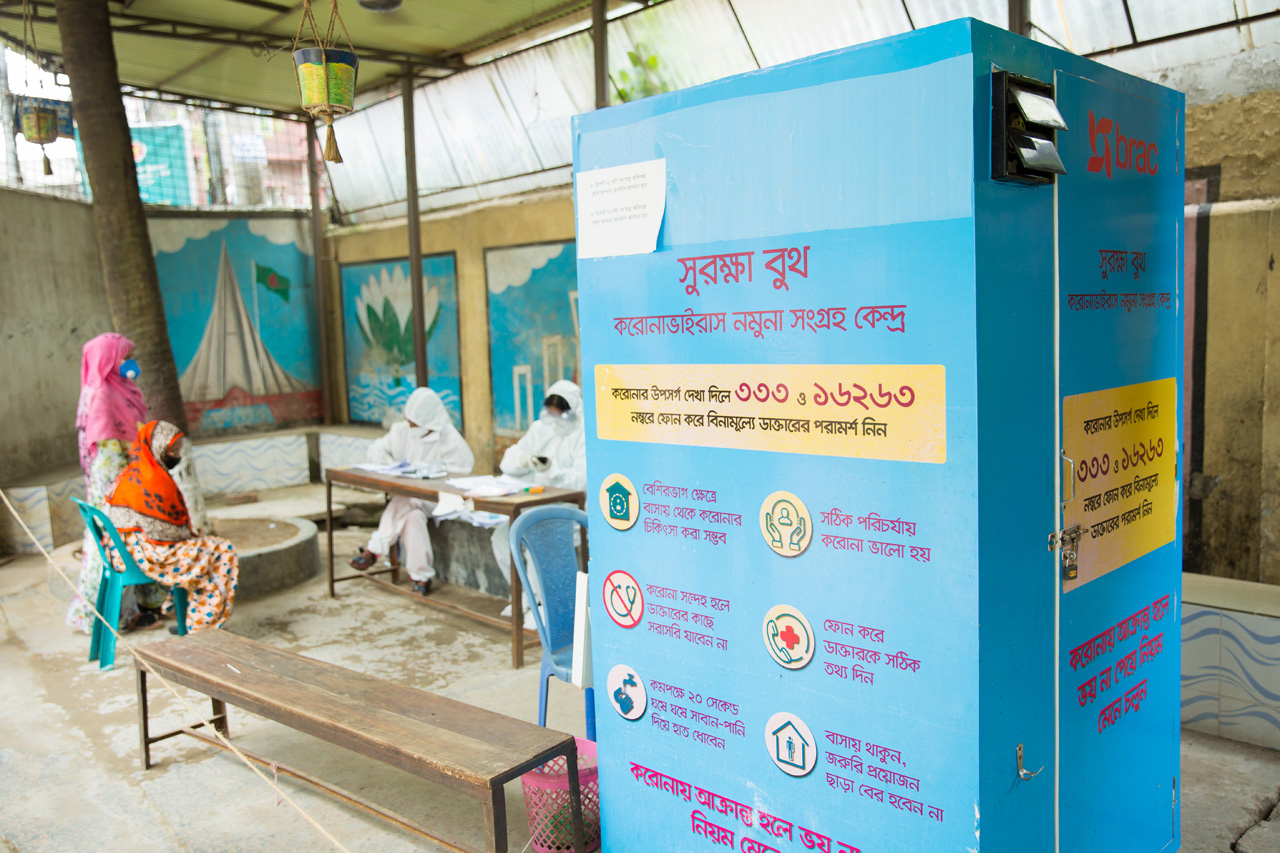
The activity will kick off primarily with 16 booths in Dhaka, Chittagong
BRAC will launch antigen-based COVID-19 rapid testing for suspected patients to get results within a comparatively shorter time period. The activity will be run under the overall supervision of the Directorate General of Health Services (DGHS). The service will initiate from tomorrow, Saturday primarily with 16 booths- 15 in Dhaka and one in Chattogram.
BRAC since March 2020 has been collecting samples to detect Coronavirus through RT-PCR test by installing testing booths (kiosks) in different parts of the country. It is now adding the Rapid Antigen Test to the existing facilities.
The plan to expand this activity has come amid the new surge in COVID-19 cases. The Rapid Antigen Test facility will gradually expand to BRAC’s 32 testing booths in Dhaka and 4 testing booths in Chattogram, according to the Health, Nutrition and Population Programme (HNPP) of BRAC.
The booths are open from 9am to 12 noon from Saturday to Thursday. Each of the booths will be able to collect and analyse 150 samples a day.
Currently, RT-PCR tests are followed in Bangladesh for the majority of the samples, which takes at least 24 hours or more to get the results. But, an antigen test will deliver the result within 30 minutes only, which, BRAC expects, will add pace to the government’s COVID-19 testing operations.
As part of its effort to support DGHS, BRAC is operating 41 walk-in sample collection booths in areas vulnerable to Novel Coronavirus across the country. These samples are transferred to government approved laboratories that deliver results after testing them in the RT-PCR process. Five of these booths are designated only to collect samples from the passengers going abroad.
Director of BRAC Health, Nutrition and Population Programme Morseda Chowdhury said, “Bangladesh’s health system got some time to prepare itself to deal with the first wave of COVID-19, but the second wave appeared too fast. To tackle the situation, there is no alternative to maintain health advisories, along with testing suspects and referring them for isolation. I hope taking the Rapid Antigen Test to the doors of the people will play an important role in this regard, as it will help speedy diagnosis and management of the patients.”
She further said, “The benefits of this initiative must be taken to all the regions vulnerable to COVID-19 for which assistance from all quarters is essential. At present, donor organisation The Foreign, Commonwealth & Development Office (FCDO) of the Government of UK is supporting BRAC and DGHS in this effort.”
Who and how to get the service
Anyone who has been referred by a registered physician, is experiencing COVID-19 symptoms like fever, dry cough, fatigue, sore throat and respiratory difficulties, or has been in contact with a confirmed COVID-19 patient, is eligible to undergo the test through BRAC operated booths.
A person must take an appointment online to get the service. The BRAC staff employed at the booths will assess the symptoms and case history of the suspect to decide whether it will be an antigen test or an RT-PCR test. If the result of a sample analysed via antigen testing detects the presence of the novel coronavirus, the service seeker will be notified within 30 minutes. Results of a positive patient tested via antigen testing will be uploaded in the website within three or four hours.
However, if a person’s antigen test results come back negative despite having symptoms, the sample will be retested using the RT-PCR procedure (sample from the patient, however will be taken once).
To get the test via BRAC booth, a person must take an online appointment at coronatest.brac.net. They must pay the government fixed Tk100 as fee via mobile money service Nagad App to get the service.
The total process of sample submission is designed in a 7-step process.
How to apply online
A service seeker must log on to coronatest.brac.net and select “COVID identification for tomorrow” tab. The answer must be “yes” to any of the three questions asked in the tab. He/she will have to select the district or city and find out the nearest booth of his/her location.
In the third step, he must click in “I agree and want a COVID-19 test” option. Clicking on the button will create an application form.
The form must be filled with necessary information, including a mobile contact number or e-mail address. Once the information is submitted, a verification code will be sent to the registered mobile number. This is why information of a correct mobile number is essential. Once the person enters the code in the website, it will confirm the application.
To complete the application, he/she has to enter the Nagad app and click on the tab “Bill Pay” where there will be an option saying fee for COVID-19 sample collection. Then select "MOHFW COVID-19 Test Booth" and pay Tk100.
Successful payment will generate a transaction code. People paying the fee from Nagad App will get a code from the app, while people paying the money from the website will get it through Short Messaging Services (SMS).
In the last stage, the person must enter a transaction number in the website to complete the application. Confirmation of the application will be sent via an SMS.
Once the sample is collected, it will be sent to the laboratories designated by DGHS. The results of the test will be sent to the recipients via SMS. BRAC does not collect any money from the test fees, which goes to the government exchequer for public welfare.
Time for report delivery
If the result of a sample analysed via antigen testing detects the presence of the novel coronavirus, the service seeker will be notified within 30 minutes and results of a positive patient will be uploaded in the website within three or four hours.
But samples collected via BRAC booths for RT-PCR tests are transferred to DGHS authorised laboratories. It is on DGHS to inform the service seeker about reports depending on the capacity of the laboratories. BRAC does not hold the jurisdiction over the time taken to test the samples and generate reports from the laboratories.
Location of BRAC Booths
BRAC will collect samples for antigen testing at 10 booths under Dhaka North City Corporation, nine booths under Dhaka South City Corporation and one booth under Chattogram City Corporation.
Among them, facilities under DNCC are available at Govt Unani and Ayurvedic Medical College Hospital in Mirpur 13, Uttara Adhunik Medical College in Sector-9 of Uttara, Uttara High School at Sector-6 of Uttara, Asaduzzaman Khan Kamal Community Center at Modhubagh of Moghbazar, Ward 10 community centre near Buddhijibi Graveyard in Mirpur-1, Chaderhat Eidgah Playground at Babor Road of Mohammadpur, Dhaka Dental College and Hospital at Mirpur 14, National Institute of Kidney Diseases & Urology in Agargaon of Sher-e-Bangla Nagar, Abdul Halim Community Center at Tejturi Bazar at Farmgate, and York Hospital (House-12, Road-22) in Banani.
Antigen services under DSCC will be available at Paltan Community Center in Naya Paltan, Bashabo Community Center, Wari Girls Government Primary School, Dhaka National Medical College in Johnson Road of Old Dhaka, and Maternal and Child Health Training Institute in Azimpur.
Office of the ward councilor in Bibirhat at Panchlaish under Chattogram City Corporation will also offer the service.
Responding to the government’s call in COVID-19 prevention activities, BRAC’s walk-in sample collection booths (kiosk) have been collecting samples of the suspected patients since March 11 last year, among which 41 are currently in operation.
BRAC, partner NGOs to mobilise communities in 38 districts under high covid risk, 58 million people to reap the benefit
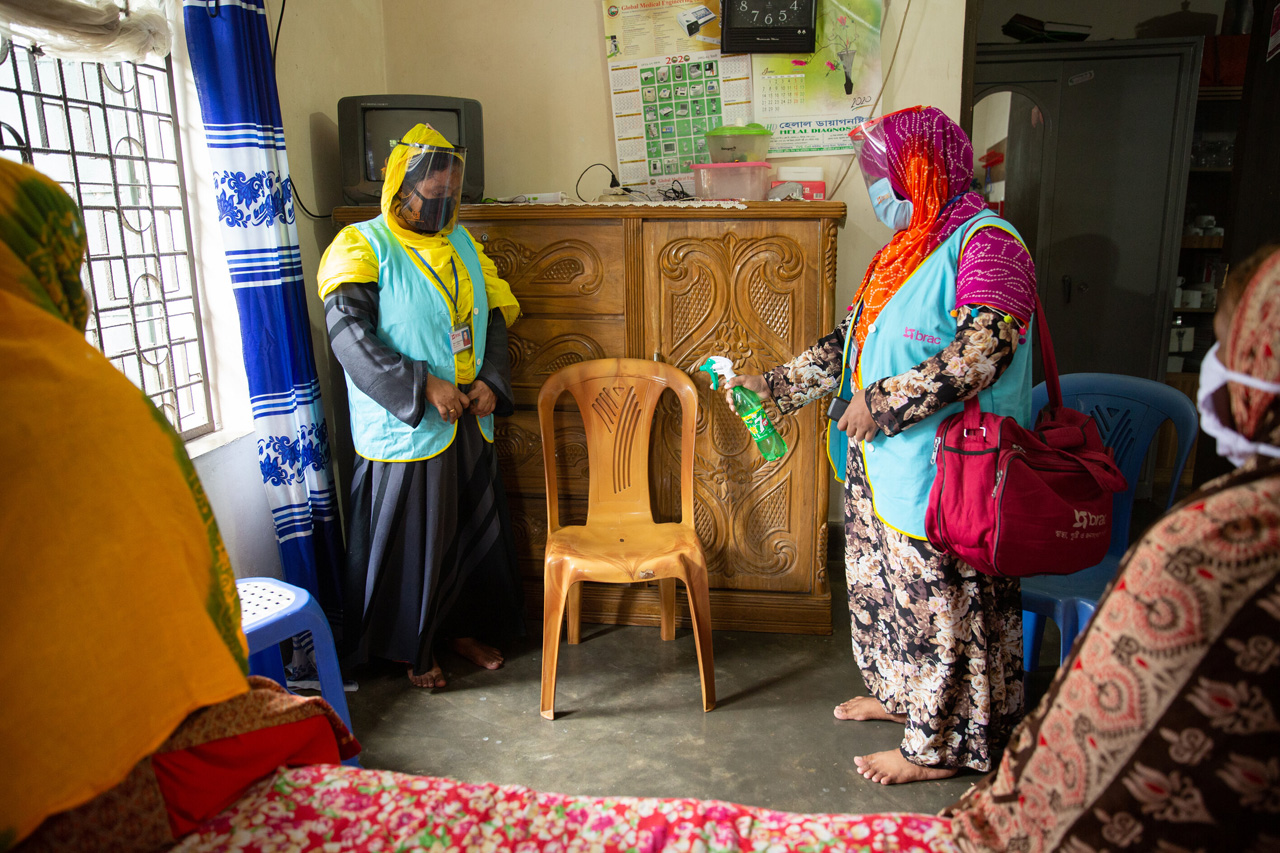
BRAC has taken up an initiative to support people living in the 38 high risk districts across Bangladesh. BRAC along with partner NGOs are all set to implement the plan through a community-driven COVID response and local level health system strengthening initiative. The decision was reached at an emergency meeting with the recently formed platform Civil Society Organisation (CSO) Alliance today on Thursday (15 April). The meeting decided that NGOs will collaboratively work across Bangladesh under an initiative styled ‘Community resilience to prevent coronavirus’ (করোনা প্রতিরোধে সামাজিক দূর্গ).
The emergency meeting was chaired by Civil Society Organisation (CSO) Alliance coordinator and advisor to former caretaker government Rasheda K Chowdhury. PRIP Trust executive director Aroma Dutta, Ahsania Mission ED Dr M Ehsanur Rahman, Hasin Jahan, Sultana Kamal, Maleka Banu, RDRS chairperson Shib Narayan Kairy and WaterAid regional director Khairul Islam also attended the meeting.
With this initiative, the NGOs together will work on spreading information on coronavirus prevention, proper use of masks and vaccine registration along with spreading awareness messages and addressing misinformation to around 58 million people living in the 38 high risk districts.
The high-risk districts with case positivity rate above 10 percent are: Dhaka, Chottogram, Rangamati Sylhet, Moulvibazar, Munshiganj, Narsingdi, Khulna, Narayanganj, Rajbari, Feni, Noakhali, Chandpur, Shariatpur, Laxmipur, Cumilla, Barisal, Rajshahi, Bogura, Narail, Nilphamari, Gazipur, Faridpur, Brahmanbaria, Jessore, Madaripur, Naogaon, Rangpur, Kishoreganj, Natore, Tangail, Pirojpur, Patuakhali, Bhola, Manikganj, Gaibandha, Dinajpur, and Mymensingh.
With the rising COVID cases, increasing number of deaths, overburdened hospitals and acute crisis in ICU facilities in Bangladesh, community level prevention with a central approach has become an emergency now.
On one hand the healthcare professionals are struggling to manage the influx of patients, while on the other people still remain mostly negligent towards following the preventive measures and healthcare guidelines. In this context a stronger focus on behavioural change and community engagement to prevent and manage COVID becomes inevitable.
About the initiative, BRAC executive director Asif Saleh said, “The fight against coronavirus prevention requires long-term initiative. It is not possible to win the fight without participation from communities. We are mobilising internal resources to initiate the programme and calling on donors and partners to come forward to scale it up. This low cost model will lead to long term benefits if it can get proper financing, and will also speed up the government’s coronavirus prevention efforts.”
BRAC in partnership with The Foreign, Commonwealth & Development Office (FCDO) of the Government of UK and under a joint initiative with the Directorate General of Health Services (DGHS) and Community Clinic Trust has piloted a community-driven COVID response and health system strengthening initiative in six districts over the past five months. Based on the success of the pilot, BRAC will scale this initiative across the 38 high risky districts identified by Institute of Epidemiology Disease Control and Research (IEDCR). BRAC will work together with partner organisations on the ground to slow down the spread of COVID-19, help flatten the curve and preserve health system capacity in these high risk districts. The initiative will have three key pillars of interventions: prevention, response to COVID case management, and promoting vaccination.
Prevention: BRAC and partners will ensure mask use, hand hygiene and social distancing through household education. Community groups will be engaged in awareness activities and rapid response. In addition, local government officials, volunteers and community leaders will be empowered with knowledge on COVID-19 related issues to ensure preventive behaviours at hotspots such as mosques, transport hubs, markets, shops, etc. Periodic assessment will be conducted to see behavioural change in the community. BRAC’s observation shows that decrease in mask use is directly related to an increase in COVID positivity rate. Hence, stronger focus needs on prevention.
Response: BRAC’s proven Community Support Team (CST ) model led by frontline community health workers will be scaled for syndromic surveillance at household level. These community based teams will identify suspected COVID-19 cases by visiting households with potential cases (identified via word of mouth approach) to conduct screening. Individuals matching with sets of clinical criteria will be connected to the telemedicine services for further support. These households will also receive information on home management of mild and moderate cases, possible referral points and testing facilities, quarantine protocols and best practices to prevent further spread of infection among the household members. Follow-ups will be conducted to ensure quarantine compliance.
Vaccination: BRAC and partners will support the local government health office for COVID-19 vaccination registration and mobilisation. BRAC’s 50,000 community health workers and volunteers will actively engage in addressing myths and rumors creating vaccine hesitancy at the community level. Furthermore, vaccination will also be promoted in each of the districts through local level miking and message dissemination via national TV, radio, newspaper and social media.
BRAC-BUHS rapid assessment on impact of covid-19 on essential healthcare services
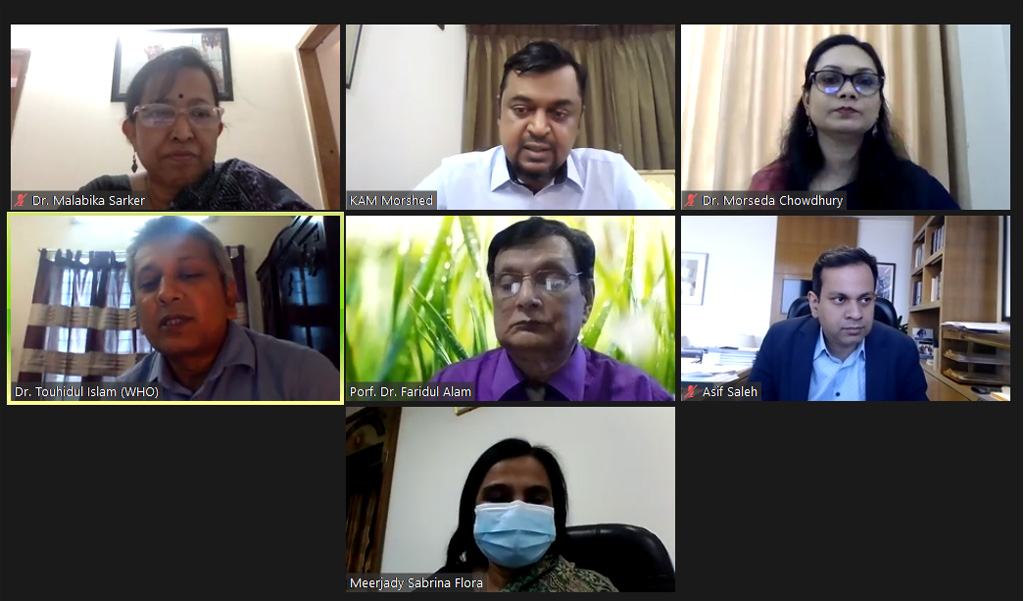
Antenatal care, postnatal care, under-5 vaccination, healthcare of emergency and chronic illness patients, elderly people and persons with disabilities suffered worse
A rapid assessment on the situation of essential healthcare in Bangladesh during the Covid-19 stresses that a number of areas of public health need enhanced effort to continue the fruits the nation had gained until the pandemic broke out last year.
According to the study report, pregnant mothers, mothers with newborns, vaccination of children below five years of age, patients needing emergency care and those with chronic illnesses, elderly people and persons with disabilities are suffering worse than others in terms of healthcare services during the ongoing pandemic situation. To remedy this situation, the report recommends that multi-faceted initiatives should be undertaken on a short and long term basis.
The findings and recommendations of the study titled “Impact of COVID-19 on Essential Health Services in Bangladesh: A rapid assessment” were shared at an online event organised by BRAC today on Sunday (11 April 2021). BRAC’s Advocacy for Social Change programme and Bangladesh University of Health Sciences (BUHS) conducted the study, which was commissioned by BRAC’s Health, Nutrition and Population Programme (HNPP).
Professor Meerjady Sabrina Flora, additional director general (planning), Directorate General of Health Services (DGHS),and Asif Saleh, Executive Director, BRAC were in presence as Chief Guest and Special Guest respectively.
In her speech, Professor Meerjady Sabrina Flora said covid-19 not only created sufferings for coronavirus patients or non-covid patients only, but it has also affected the government’s successful health programs and disease prevention programs as well.
“Along with the general people, the government wants to work together with committed associate organisations not only for covid-19 containment, but also to ensure essential healthcare facilities for all where partnering organisations will have equal partnership in the process being led by the government,” she said.
BRAC executive director Asif Saleh said, “Strengthening of the community system has become extremely important since covid-19 is not going away within two or two and a half years. BRAC wants to work in the field of prevention, protection and mobilisation.”
He also said, “Last year, we worked on community mobilisation in Gazipur and later expanded the service in six districts with support from FCDO. The project brings fruitful outcome as the transmission rate is lower in the districts now and the rate of vaccination is comparatively higher. Now, we want to spread this program to the areas across Bangladesh, particularly in areas where transmission rate is higher. Also, BRAC is ready to provide technical assistance to other NGOs in places where BRAC does not operate.”
Following the presentation on findings, a panel discussion was addressed by, among others, Dr Morseda Chowdhury, associate director, HNPP, and Professor Faridul Alam, vice chancellor, BUHS. Professor Dr Malabika Sarker, associate dean, James P Grant School of Public Health at BRAC University, and Dr. Md. Touhidul Islam, National Professional Officer at World Health Organization also spoke in the panel. KAM Morshed, senior director, BRAC, moderated the panel discussion.
Carried out between April and August in 2020, the rapid assessment covered randomly selected 2,483 households with an average family size of 4.89 people in 16 districts of eight divisions. The survey found that 167 of the households had pregnant women during the survey period. A total of 49 babies aged from 0-28 days were found in the surveyed households. There were 794 under-five children which covers 32% of total household members.
According to the report, 60.8% of households experienced some form of sickness (other than COVID-19), while 28.6% reported higher clinical costs. 10% of households reported difficulty in availing health services from hospitals. Two fifths of households reported that their health status had deteriorated due to lack of proper healthcare.
The situation was particularly worse for women and children. 54% of pregnant women did not get all the services which were provided to pregnant mothers before the pandemic. According to the 2017-18 data of DGHS, on average 47% pregnant women received 4 visits for antenatal care (ANC). This study found that 37.6% pregnant women received 4 ANC services during the survey period, which is around 10% lower than the national average. 20% of deliveries were conducted by untrained midwives during the survey period. One in seven children was not taken to hospitals when they fell seriously ill mainly due to the high transportation cost and fear of covid-19. The overall situation was much worse in rural areas compared to the urban ones.
Patients with chronic diseases also suffered significantly. 56.32% of chronic disease patients reported that fear of coronavirus barred them from seeking treatment, while 54.51% reported financial difficulties. Treatment for mental illnesses and disabilities was of particularly poor state, more so in rural areas.
Despite high initial demand, telemedicine services were only utilised by 6% of households surveyed. The most common reason cited was that service seekers could not explain their symptoms properly.
Speaking at the panel discussion, Professor Faridul Alam, vice chancellor, BUHS said, the health sector in Bangladesh is poorly structured and this is why it cannot face any emergency. He demanded to transfer the healthcare system to the local health authority.
Professor Dr Malabika Sarker, associate dean, James P Grant School of Public Health at BRAC University, called upon the authorities to provide technological training and other institutional support to the field level health workers to build their capacity.
Dr. Md. Touhidul Islam, National Professional Officer at World Health Organization, said, “The government need to shift its focus from infrastructural development to more human development and invest in places where it is needed.”
To mitigate the challenges in the healthcare service delivery caused by the pandemic a number of recommendations were made in study. Priorities among these are, revisiting the national service delivery system in the context of the ongoing pandemic, robust utilisation of information and communications technologies, strengthening of health information systems and boosting the efficacy of coordination tasks. Adequate recruitment of health workforce and training to equip them with necessary mix of skills, while installing modern diagnostic and medical equipment are also crucial. Improving the effectiveness of referral mechanisms should be focused. Lastly, rethinking of the health financing is essential to build and sustain an adequately strong universal healthcare system in Bangladesh.
Join the world’s biggest family

